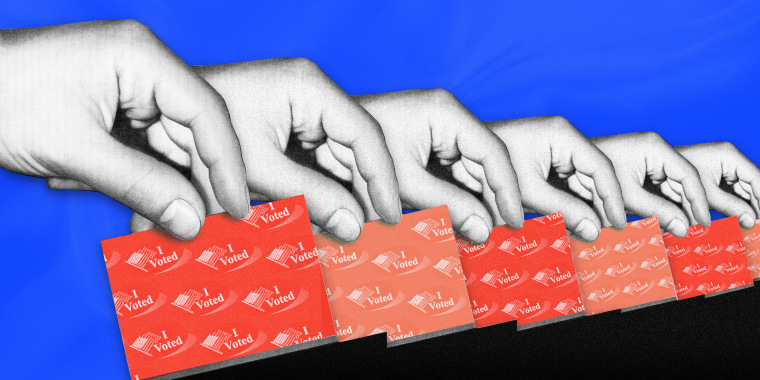Fourteen states and one territory held nominating contests for the Democratic Party's candidate for president on Tuesday, the most pivotal day on the presidential primary calendar.
When the polls closed on Super Tuesday and results came in, it became clear that former Vice President Joe Biden had swept the Southern states, winning the primaries in Virginia, North Carolina, Alabama, Tennessee, Oklahoma, Arkansas and Texas, as well as Minnesota and Massachusetts, and had ended the night with the most delegates. Sen. Bernie Sanders came out on top in Colorado, Utah and his home state of Vermont, NBC News projected.
On Wednesday, NBC News declared Biden the apparent winner in Maine, though the race against Sanders in the state was a tight one.
More than 1,300 delegates — about a third of the total — were at play, more than on any other day in the primary season.
Download the NBC News app for full coverage and alerts on the latest news.
Sanders: 'Establishment put a great deal of pressure on Pete Buttigieg, on Amy Klobuchar' to back Biden
WASHINGTON — Bernie Sanders said Sunday that the Democratic Party establishment pressured his former presidential primary opponents to back Joe Biden ahead of Super Tuesday.
Both former South Bend, Ind. Mayor Pete Buttigieg and Minnesota Sen. Amy Klobuchar endorsed Biden in the days before the Super Tuesday contests. The former vice president did better than originally expected in those contests last week, racking up a delegate lead over Sanders and upending the nominating fight.
"The explanation is not complicated. The establishment put a great deal of pressure on Pete Buttigieg, on Amy Klobuchar who ran really aggressive campaigns," the Vermont Independent senator said.
"I know both of them. They worked really, really hard. But suddenly, right before Super Tuesday, they announced their withdrawal. If they had not withdrawn from the race before Super Tuesday, which was kind of a surprise to a lot of people, I suspect we would have won in Minnesota, we would have won in Maine, we would have won in Massachusetts."
Buttigieg senior adviser Lis Smith responded to Sanders in a tweet, saying that his "decision to get out of the race was his and his alone."
On Sunday, California Sen. Kamala Harris also endorsed Biden.
Earlier in the interview, Sanders argued his campaign is well-suited to win the state of Michigan, which holds its primary on Tuesday, taking shots at Biden's record in the process.
"I think we've got a real shot to win here in Michigan because the agenda that we are talking about is an agenda that works for the working families of this state," Sanders said Sunday on "Meet the Press."
"And furthermore, it really contrasts my views with Joe Biden. Now that we're down a two-way race, I think it is clear for the American people to see where Biden's record is and where my record is."
Sanders pointed to Biden's support for trade agreements, which the Vermont senator said cost Michiganders jobs. And he said that Biden's support from some wealthy donors undercuts his ability to represent the working class.
He went on to defend from the Biden campaign's argument that negative campaigning will hurt Democrats' ability to defeat President Trump in November, a message the Biden campaign is putting up on the airwaves.
Biden: Trump doesn't want to face me
Biden, fresh off his Super Tuesday success, told NBC News' Savannah Guthrie that "the one thing the president doesn't want to do is face me."
"I will beat him," he added. "Period."
Gov. Steve Bullock 'pretty serious' about Montana Senate bid
Montana Gov. Steve Bullock is "pretty serious" about running for the U.S. Senate, a person familiar with Bullock's thinking tells NBC News.
The filing deadline to enter the race is Monday.
Bullock, a former 2020 presidential candidate, has citied his three children, two in high school and one in middle school, in repeatedly saying he has no intention of challenging Republican Sen. Steve Daines, who is up for re-election in November.
Bullock is in the final year of his two terms as governor.
Sanders says attacks urging Warren to drop out are 'disgusting'
Sanders on Wednesday called the online attacks against Warren urging her to drop out of the race "disgusting" and said people should "respect the time and the space that she needs to make her decision."
The Vermont lawmaker said he spoke with Warren over the phone earlier Wednesday and said that she had not made any decision regarding her campaign.
"What Senator Warren told me is she is assessing her campaign," he said. "She has not made any decision as of this point and it is important for all of us, certainly me who has to know Elizabeth Warren for many, many years, to respect the time and the space that she needs to make her decision."
Warren campaign manager Roger Lau told staff in an email Wednesday morning that the senator is assessing her path forward in the 2020 race after a disappointing Super Tuesday finish.
Sanders called her an "excellent senator" who has run a "strong campaign" and called for an end to the online attacks.
"I think the Twitter world is an opportunity for people to debate issues...but not to make vitriolic attacks on someone because you disagree with them," he said.
Joe Biden is the apparent winner in Maine, NBC News projects
Joe Biden is the apparent winner of the Democratic primary in Maine, NBC News projects.
Maine is the 10th Super Tuesday state that the former VP has won. California is the only Super Tuesday contest that has yet to be called by NBC News.
House Homeland chair seeks protection for 2020 candidates after Biden incident
House Homeland Security Committee Chairman Bennie Thompson is requesting Secret Service protection for the Democratic presidential candidates after anti-dairy protesters stormed the stage at former Vice President Joe Biden's rally on Tuesday night.
Biden and Bernie Sanders in particular appear to satisfy several criteria for affording the protection, Thompson, D-Miss., wrote in a letter to acting Homeland Security Secretary Chad Wolf and congressional leaders.
"Taking into consideration the remaining candidates’ large campaign operations, high polling averages, as well as physical threats to their safety — all factors contemplated by the Guidelines — I urge you to immediately initiate the consultation process to determine whether to provide USSS protection to certain major Democratic presidential candidates," Thompson wrote.
Secret Service protection is assigned to candidates based on decisions made by the top Democratic and Republican leaders of Congress in consultation with the homeland security secretary and the Secret Service.
“The Democratic Congress is worried about it,” Rep. Cedric Richmond, D-La., the Biden campaign's co-chairman, said Wednesday after a reporter asked whether the incident at Biden's rally had prompted a request for protection.
Heading into the Super Tuesday Democratic primary contests, President Donald Trump professed nonchalance about the outcome.
"I don't care who wins," he told reporters at the White House, downplaying the impact of results that could affect his re-election fortunes.
The hours that followed did bring bad news for the president: A leading potential competitor, Joe Biden, proved his strength Tuesday night among key groups of voters needed to win the general election, with the former vice president claiming solid support from black and suburban voters.
But the night also delivered some good news for him and his team: the reality that the Democratic contest appears far from over, with Bernie Sanders' progressive wing showing no signs of coalescing behind the establishment pick — meaning weeks, if not months, of potential party infighting.
Trump's advisers have long said their best-case scenario wasn't the emergence of one particular candidate but rather a drawn-out Democratic nominating process that would divide the party. With Sanders and Biden now in a clear two-man race, that scenario seemed likely.
Read the full analysis here.
President Donald Trump called Joe Biden's Super Tuesday performance an "incredible comeback" during a meeting at the White House on Wednesday before mocking both Elizabeth Warren and Mike Bloomberg's poor showings.
Warren "was really a spoiler" for progressive rival Bernie Sanders while Bloomberg "made a fool out of himself," Trump told reporters.
The president made the comments about the candidates gunning for his job after allowing reporters in to part of a meeting administration officials were having with airline executives about the coronavirus. Reporters were being ushered out of the room after Trump answered several questions about the virus when the president said, "I can't believe it. No questions on the election?"
Read more on what Trump said about the Democratic candidates' showings on Tuesday.
#RiggedPrimary trends, but not for the reason you'd think
The morning after Biden won most of the Super Tuesday states, the hashtag #RiggedPrimary surged to the top of Twitter’s trending topics section— despite no evidence that any of the contests had been rigged.
The hashtag received initial support from fans of Sanders, who claimed that the recent dropouts of Buttigieg, Klobuchar and Steyer were part of a coordinated, Democratic Party-fueled conspiracy to vault Biden to the nomination.
But the hashtag was primarily driven to the top spot, however, by people denouncing the idea that the primary was rigged, accidentally fanning conspiracy flames. The top three tweets receiving the most engagement about the hashtag on Wednesday morning all bemoaned the viral spread of the hashtag.
The same phenomenon, where a political hashtag became the top trend in the U.S. because of users tweeting viral denunciations, occurred in January when Warren defenders accidentally pushed the hashtag #NeverWarren to the top of Twitter’s trending topics.
Super Tuesday lessons: 7 key takeaways from a big night
WASHINGTON — It was the biggest night of Joe Biden's half-century in politics. Bernie Sanders fell short but notched up some valuable victories to make it a two-person race. Elizabeth Warren lost her home state and Mike Bloomberg went bust on a half-a-billion dollar bet.
The South Carolina victory, the consolidation of moderate rivals and even the fear of the coronavirus propelled the former vice president to victories in a majority of the 14 states that voted Tuesday, from New England to the South to the Midwest. He won Virginia, North Carolina, Massachusetts, Tennessee, Oklahoma, Alabama Arkansas, Minnesota and Texas.
Sanders won Colorado, Utah and Vermont. Maine and California were still too close to call.
As of Wednesday morning, Biden led with 453 delegates, while Sanders had 373; Warren was miles behind with 39 and Bloomberg had 18, according to NBC News projections.
Click here for seven takeaways from a big day of voting:
Trump tweets on Bloomberg's exit
And he didn't stop there.
Bloomberg's massive Super Tuesday spending netted little
Former New York City Mayor Mike Bloomberg's unprecedented spending threatened to shake up the Democratic presidential race, but as the dust continues to settle, he appears to have little to show for it.
Bloomberg dropped about $198 million in television and radio ads in states that held their nominating contests on Super Tuesday, according to ad-tracking firm Advertising Analytics. And as of 10 a.m. ET, Bloomberg has netted just 18 delegates — $11 million per delegate so far with results still coming in.
That showing led to Bloomberg dropping on Wednesday morning, arguing that "after yesterday’s results, the delegate math has become virtually impossible — and a viable path to the nomination no longer exists."
Bloomberg's dollar-for-delegate tradeoff has been massive, but that investment is magnified when compared to how many delegates Biden is poised to win in states where he spent markedly less.
Despite not spending a dime on the air in Massachusetts, Biden is projected to win the state. Bloomberg, who spent almost $10 million there on those ads, is at 12 percent with 95 percent of precincts reporting.
In Texas, Bloomberg spent $52 million on TV and radio ads and appears to be poised for a distant third-place finish. Biden is the projected winner there, having spent about $463,000 on those ads.
Overall, Bloomberg spent just over $112 million on the airwaves in the Super Tuesday states that the NBC News' Decision Desk projects Biden will win. Biden spent $1.4 million on the airwaves in those states he's projected to win.
So far, Biden is projected to net 400 delegates on Super Tuesday alone.
Sanders launches three new ads targeting Biden
Bernie Sanders launched three new ads on Wednesday in nine states targeting former Vice President Joe Biden as the race rapidly narrowed following Biden's Super Tuesday victories.
One of the ads, "Feel the Bern," focuses on past comments then-President Barack Obama made about Sanders, complimenting him for being authentic and someone who has gotten bills passed for veterans. It's a new kind of ad for Sanders, as his campaign typically likes to draw on Sanders being an outsider, rather than a deal-maker.
Biden has consistently run his own TV and digital ads that show Obama complimenting him and granting him the Presidential Medal of Freedom. And the Biden team is responding to Sanders' use of Obama, saying that Obama "chose" Biden, while Sanders considered a primary challenge against him.
"Barack Obama chose Vice President Biden to be his partner over 8 years in the White House, entrusting him with managing the stimulus that saved our economy from a depression, obtaining the deciding vote for the Affordable Care Act, and countless national security priorities," Biden campaign spokesperson Andrew Bates said. "By contrast, Senator Sanders explored a primary challenge to President Obama, who he compared to a 'moderate Republican' and said was not a 'progressive.' As recent history has proven, no quantity of ads can rewrite history — and there's no substitute for genuinely having the back of the best president of our lifetimes."
The Biden team is also re-upping an ad they ran against Sanders in South Carolina that focused on Sanders' consideration of a primary challenge.
Sanders' two other ads, "Protect Social Security" and "Decimated," take direct aim at Biden's past votes.
The ads call out Biden for comments he made about freezing federal spending, which would have included Social Security benefits for a limited time, and for supporting trade deals, like NAFTA, that Sanders opposed.
Sanders and Biden have traded barbs on Social Security and trade deals before — Sanders is one of the only Democratic presidential candidates who voted against and spoke out against the United States-Mexico-Canada trade agreement.
The new ads will run in Arizona, Florida, Idaho, Illinois, Michigan, Missouri, Ohio and Washington — all of which vote on either March 10 or 17.
Bloomberg ends presidential campaign, endorses Biden
Mike Bloomberg, the billionaire former New York City mayor who jumped into the 2020 presidential race late and spent over $500 million on an unorthodox campaign, has ended his bid for the Democratic nomination, but vowed to stay in the fight in an attempt to defeat President Donald Trump in November.
“After yesterday’s results, the delegate math has become virtually impossible — and a viable path to the nomination no longer exists," Bloomberg said in a statement. "But I remain clear-eyed about my overriding objective: victory in November. Not for me, but for our country. And so while I will not be the nominee, I will not walk away from the most important political fight of my life."
Bloomberg said defeating the president means uniting behind the most viable Democratic candidate, which he deemed to be former Vice President Joe Biden.
Click here for the full story.
Warren assessing path forward in 2020 race, aide says
Sen. Elizabeth Warren, D-Mass., is assessing her path forward in the Democratic presidential race, an aide to the contender told NBC News on Wednesday morning.
The aide said that Warren is discussing the next steps with her team.
Warren campaign manager Roger Lau sent an email to staff Wednesday morning, saying they are “disappointed“ and that they’re assessing the path forward. He noted that Warren’s “going to take time right now to think through the right way to continue this fight.”
Warren did not win any of the Super Tuesday contests, including her own state of Massachusetts, which former Vice President Joe Biden won.
According to the NBC News delegate count so far in the primary season, Warren has been allotted 39 delegates in total, compared to 453 for Biden and 373 for Sen. Bernie Sanders, I-Vt.
This comes as former New York City Mayor Mike Bloomberg is also reassessing his campaign.
Clyburn 'surprised' by Biden's strong Super Tuesday performance
House Majority Whip Jim Clyburn, D-S.C., said Wednesday that he was "surprised" by former Vice President Joe Biden's wins on Super Tuesday
“I was a bit surprised," Clyburn said in an interview on CNN. "It did go better than many of us expected. [For Biden] to be one point ahead in Maine, no I didn't expect that. [For Biden] to be winning Massachusetts, I did not expect that at all."
Clyburn is considered to have played a major role in influencing Biden's victory in South Carolina's primary last week after he endorsed the former vice president.
As of Wednesday morning, Maine was still too close to call, according to NBC News. Clyburn said he "had no idea" what former New York City Mayor Mike Bloomberg would do after his poor showing on Tuesday, but said Democrats should all coalesce around Biden.
"I do believe in Joe Biden. He gives us the opportunity to bring this country back to what the founding fathers had in mind and what we've been trying to do, trying to build a more perfect union," Clyburn said. “I think that all of the stuff about him being too touchy, making people uncomfortable, I think it caused him to pull back and not be himself. He is a guy who is very affectionate, is very, well, let's call it compassionate. And I think that that's what had him a little bit robotic going into this campaign.”
Asked where he thinks Biden would be if he had not endorsed him, Clyburn said, "I know what you're trying to get me to say. I'm not gonna say it. Just let me say this, I feel that this country's democracy is at stake."
On MSNBC Tuesday night, longtime Democratic strategist James Carville credited Clyburn with changing the dynamics of the race.
"That guy literally saved the Democratic Party," he said.
Bloomberg spent nearly $200M on ads. It didn't get him much.
Money can buy you (a lot) of ads, but for Michael Bloomberg, it couldn’t win him states.
The billionaire former New York City mayor’s eye-popping ad spending made headlines in recent weeks, as Bloomberg dropped a whopping $198 million on television and radio ads between Jan. 1 and Tuesday, according to the ad-tracking firm Advertising Analytics.
But despite spending almost five times more cash than the rest of the remaining Democratic field combined, Bloomberg came away with a disappointing night, winning the American Samoa primary and 18 delegates nationwide — approximately $11 million per delegate.
Click here for the breakdown.
FIRST READ: Biden grabs the delegate lead, and it's going to be hard for Sanders to catch him
We mapped out yesterday morning what we thought might be a super Super Tuesday for Joe Biden. We just didn’t realize how great for him it would actually be.
Biden won nine states (Alabama, Arkansas, Massachusetts, Minnesota, North Carolina, Oklahoma, Tennessee, Texas and Virginia) versus three for Bernie Sanders (Colorado, Utah and Vermont), with two states still not called by NBC News (California and Maine).
More significantly, Biden has won — so far — 87 more delegates than Sanders from yesterday's contests, according to NBC’s Decision Desk. And even when all of the California delegates eventually get allocated, we still believe Biden will emerge as the delegate winner from Super Tuesday.
And here’s why that’s a problem for Sanders: The future contests don’t get any easier for him.
Get the rest of First Read here.
Aides convinced Trump to hold his fire on Jeff Sessions — until Wednesday
President Donald Trump had been privately itching for days to weigh in on Alabama's Senate race to bash his first and former Attorney General Jeff Sessions, who is running to win his old seat back, but aides convinced him to hold his fire — until Wednesday morning.
The president wanted to criticize Sessions in advance of Tuesday's primary, two people close to Trump said, but they encouraged him to hold his fire until results came in.
Sessions, who served in the Senate until he joined the Trump administration, is now headed for a tight runoff in Alabama against former Auburn University football coach Tommy Tuberville. Sessions lavished praise on the president during a watch party in Mobile on Tuesday night.
Sessions called the president a "man of action" Tuesday and questioned Tuberville’s loyalty to Trump.
"Where was he when President Trump needed him? What did he do for Trump? Never said a kind word about him that I can find, never gave a single penny of his millions to the Trump campaign. So one thing is clear: there’s no doubt where I stand on the issues, no doubt of my support for Donald Trump and his agenda."
On Wednesday morning, however, Trump blasted him on Twitter.
"This is what happens to someone who loyally gets appointed Attorney General of the United States & then doesn’t have the wisdom or courage to stare down & end the phony Russia Witch Hunt. Recuses himself on FIRST DAY in office, and the Mueller Scam begins!" Trump tweeted.
NBC News Exit Poll: Across Super Tuesday States, Sanders fared better among men
Sen. Bernie Sanders, who has fallen behind in the race for delegates in the Democratic primary, fared better Tuesday among male voters, according to an NBC News Exit Poll.
Thirty-seven percent of men backed Sanders Tuesday compared to 30 percent who voted for former Vice President Joe Biden. Twenty-eight percent of women, meanwhile, backed Sanders while 35 percent supported Biden.
Women voters supported Warren and Biden at higher rates than men.
The gender gap was wider among more liberal voters, with 45 percent of liberal men backing Sanders compared to 23 percent for Biden. Liberal women, meanwhile, split at higher rates for Biden and Warren.
And there was a similar gap among younger primary voters with 59 percent of men under age 45 supporting Sanders and 48 percent of women in that age group backing him.
Biden still leads in delegate count, California and Maine too close to call
As of 7 a.m. ET Wednesday, Joe Biden was projected to win nine Super Tuesday primary contests, including Texas, while several races remained still too close to call.
Biden has picked up 56 delegates in the Lone Star State and Sanders has received 47 delegates, though it could take at least several days to fully distribute the delegates to the candidates.
California still remained too close to call, according to NBC News projections, where 415 delegates are at stake. Sanders, however, was leading Biden 33.1 percent to 24.2 percent with 51 percent of the vote in.
Maine's primary is also too close to call, though Biden was leading Sanders by the slightest margin, 33.9 percent to 32.9 percent.
In total, Biden's delegate count has surged to 453 so far and Sanders has received 373.
You wanna get to Joe, you have to go through Jill
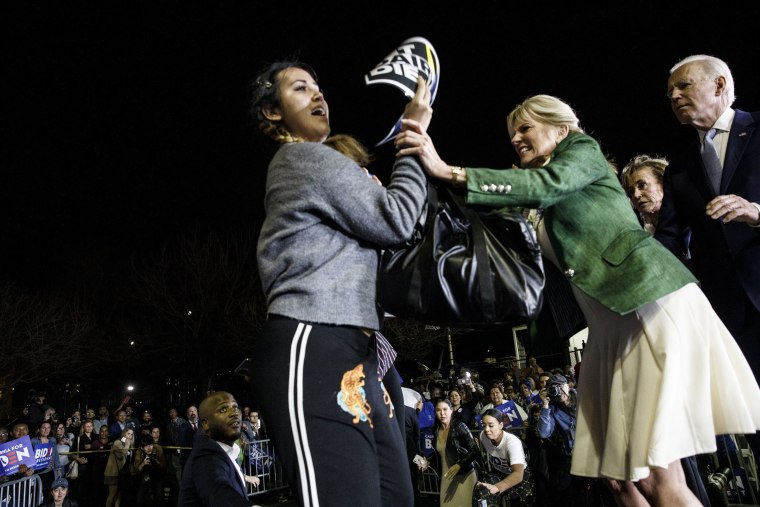
Trump: Warren 'selfish' for staying in race, says she 'hurts Bernie badly'
President Donald Trump suggested Wednesday morning that Sen. Elizabeth Warren hurt Sen. Bernie Sanders in the Massachusetts primary Tuesday night, which allowed former Vice President Joe Biden to prevail in the state.
In a follow-up tweet, Trump said that it's "so selfish" for Warren to remain in the Democratic race.
As of 7 a.m. ET Wednesday, Warren has secured 39 delegates, according to the NBC News delegate count, compared to 453 for Biden and 373 for Sanders.
Biden scores major delegate haul on Super Tuesday, NBC News projects
LOS ANGELES — Joe Biden's stunning sweep of most Super Tuesday states has rocketed him to the lead in the all-important delegate count over Bernie Sanders, according to NBC News projections based on early results.
The total delegate haul is yet to be determined, since many states have yet to fully report their results. That includes California, the biggest state in the contest with 415 delegates, where Bernie Sanders is leading with just over a third of the vote counted.
As of 2 a.m. ET Wednesday, NBC News projects Biden gained 342 on Super Tuesday, bringing his delegate total to 395. Sanders, meanwhile, so far won 245 delegates and is now at 305. Elizabeth Warren has gained only 13 delegates so far, giving her a total of 21.
Those totals will rise as more votes are counted.
Super Tuesday's silver lining for Trump: The Democratic race is far from over
Heading into the Super Tuesday Democratic primary contests, President Donald Trump professed nonchalance about the outcome. "I don't care who wins," he told reporters at the White House, downplaying the impact of results that could affect his re-election fortunes.
The hours that followed did bring bad news for the president: a leading potential competitor, Joe Biden, proved his strength Tuesday night among key groups of voters needed to win the general election, with the former vice president claiming solid support from black and suburban voters.
But the night also delivered some good news for him and his team: the reality that the Democratic contest appears far from over, with Bernie Sanders' progressive wing showing no signs of coalescing behind the establishment pick — meaning weeks, if not months, of potential party infighting.
Trump’s advisers have long said their best-case scenario wasn’t one particular candidate emerging, but rather a drawn-out Democratic nominating process that would divide the party. With Sanders and Biden now in a clear two-man race, that scenario seemed likely.
Read more here.
Biden wins Texas, NBC News projects
Joe Biden will win the Texas Democratic primary, NBC News projects.
With the final results still pending in California, Biden will end Super Tuesday with the most delegates.
Precinct changes might explain long lines to vote in Los Angeles, Texas
There's a common link between the long lines in Los Angeles and Harris County, Texas: Both switched from a "precinct-based" system to a one-stop "vote center" model, Eddie Perez, global director of technology development at the OSET Institute, a nonprofit that conducts election technology research, told NBC News.
Vote centers let voters vote anywhere. They can vote on their lunch breaks. They're supposed to increase voter turnout. There's no hurdle by getting your location wrong or not knowing where to vote. They're also popular in Texas. Over 50 counties use them, known there as "countywide polling places."
They also allow administrators to close polling locations and consolidate at these voting supercenters.
But with the supercenters, it's easy for officials to misjudge how many vote centers are needed or put them in the wrong place or overestimate how much early voting you get. You could end up with taxed resources and long lines, which may have been what happened tonight.
"We attribute the lines to an unusually high and enthusiastic turnout at several locations due to the national platform," Roxanne Werner, communications and voter outreach director for the Harris County clerk's office, wrote NBC News in an email. She noted that the county experienced more in-person votes than during the early voting period.
"Vote Centers allowed people who would have headed to an already busy voting location alternative options," Werner wrote.
Voters waited at least 5 hours in one Texas polling station
Pizza plus a long wait well after polls close
Trump camp publicly batting down Joe-mentum but privately concerned
We know President Donald Trump has been watching the Super Tuesday returns roll in — he predicted earlier that it would be an "interesting evening of television" — as he goes after both Mike Bloomberg and Elizabeth Warren on Twitter.
The self-styled political pundit-in-chief has acknowledged that Joe Biden has been looking better than observers initially expected before South Carolina, but his campaign is working to bat down any Joe-mentum.
"Everyone should remember that he is just as terrible a candidate right now as he was a few days ago," Trump campaign manager Brad Parscale said tonight, also echoing the president's accusation today that "establishment Democrats" are trying to rig the nomination against Bernie Sanders.
Despite the public bravado, those close to the president have long been concerned privately about a head-to-head matchup against Biden in the general election, specifically in key Rust Belt states, and that remains the case this evening, though of course we're a long way off from knowing whom the Democratic nominee will be.
And that's something Team Trump is seizing on — the expected chaos if, in fact, Democrats end up barreling into a contested convention. The longer the Democratic fight plays out, the better it is for the president in the eyes of his advisers, who tonight are seizing on a "splintered" Democratic Party. Watch for Trump allies to start to concentrate their fire on Sanders and Biden moving forward.
As we talk about what's next, keep this in mind: For the first time in a while, there are no rallies or events on the campaign schedule right now. That's after weeks of counterprogramming with trolling (his word, not just ours) of Democrats by the president as he visited states critical to Democrats' chances to try to draw crowds and attention.
Still, the Trump camp is counting its cash after hitting some big fundraising goals in the last six months: The Republican National Committee's touting $86 million that it brought in last month, plus $60 million more in January.
It's something first daughter and senior White House aide Ivanka Trump touched on in a recent New York Times interview, suggesting that she can out-raise Biden at events: "As an example, she pointed to a rare donor event that she headlined in Houston last November, where she said she raised $2 million in 45 minutes."
And now, Team Trump plans to deploy what it considers its secret weapons — Ivanka and first lady Melania Trump — later this month to raise money more aggressively than at any other point of the campaign.
NBC News Exit Poll: Young Democrats prioritize a candidate who agrees with them on issues over beating Trump
Younger and older Democratic primary voters do not see eye to eye when it comes to the type of candidate they want their party to nominate.
According to the NBC News Exit Poll in Super Tuesday states, a majority of Democratic voters under age 30 say that, if they had to choose, they would rather see the party nominate a candidate who agrees with them on major issues than a candidate who can beat President Donald Trump.
Older Democratic primary voters disagree. Roughly 6 in 10 primary voters ages 30 to 59 and 73 percent of voters ages 60 and over would rather have a candidate who can beat Trump than one who agrees with them on major issues.
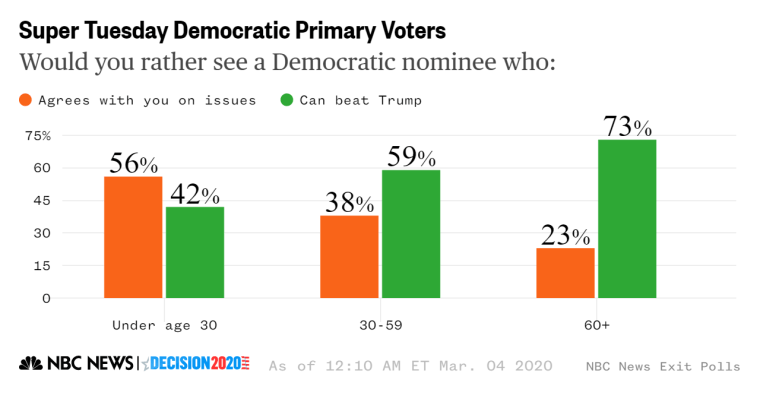
As Super Tuesday becomes Wednesday, here's where things stand
Here's where things stand right around midnight on the East Coast:
- Biden is projected to win Massachusetts, Virginia, North Carolina, Tennessee, Arkansas, Oklahoma, Alabama and Minnesota.
- Sanders is projected to take Utah, Colorado and Vermont.
- Bloomberg won American Samoa.
- Texas, Maine and California are too close to call.
Bloomberg to huddle with advisers in NY, reassess staying in race
Bloomberg is reassessing whether to stay in the race. The former mayor is flying from Florida to New York late Tuesday to huddle with top advisers in the morning to make that decision.
Senior campaign officials tell NBC News that no decision had been made yet.
Bloomberg has no public events scheduled for Wednesday.
A quiet night for disinformation watchdogs
The Department of Homeland Security and disinformation experts monitoring social media had a relatively quiet night on Super Tuesday.
A senior official with Homeland Security's Cybersecurity and Infrastructure Security Agency said disinformation campaigns from foreign influencers appeared to maintain their usual daily level, with little primary day uptick.
Twitter removed a handful of accounts that spread false claims that coronavirus fears were disrupting or delaying voting. When NBC News reported several accounts to Twitter, the company confirmed that it took enforcement actions against the tweets and also said it took action against a small amount of other content violating its election integrity policies.
Facebook confirmed that it removed a small number of posts that violated its election content policies. Google didn't respond to a request for comment.
The fear of election interference from foreign and domestic actors following the well-documented Russian interference in 2016 has led to a state of heightened alert among election and security officials, social media platforms and researchers.
Though noise appeared low this primary day, that doesn't mean it can't perpetuate negative sentiment, said Joan Donovan, director of the Shorenstein Center's Technology and Social Change Research Project at Harvard University.
"Some aspects of trolling rely on hyping up particular emotions, and outrage and fear are two motivating emotions that may increase a claim's believability," Donovan said. "It's becoming increasingly apparent that the only group that can stop this kind of misinformation are platforms themselves." — Kevin Collier contributed reporting.
NBC News Exit Poll: Biden wins Democratic primary in Massachusetts, Warren's home turf
Joe Biden beat Elizabeth Warren on her home turf of Massachusetts in Tuesday's Democratic primary. Biden captured the lion's share of support from late-deciding voters. Roughly 4 in 10 voters who made up their minds in the last few days broke for Biden, according to NBC News Exit Poll results.
Biden does well with voters in the state who are looking for a candidate who can unite the country, and he wins nearly half of moderate or conservative voters there, as well as those ages 65 and older.

Biden also won strong support from voters who consider health care the top issue. But in contrast to Bernie Sanders' voters, a majority of those who voted for Biden in the Massachusetts primary oppose a single-payer plan.
Ilhan Omar, a Sanders supporter, throws shade at Warren
NBC News Exit Poll: Bloomberg voters like Biden, lukewarm on Warren, sour on Sanders
Amid calls from party officials that Mike Bloomberg consider dropping out in the wake of his disappointing results in today's primaries, results from the NBC News Exit Poll suggest that Joe Biden could enjoy a strong advantage among the former New York mayor's supporters.
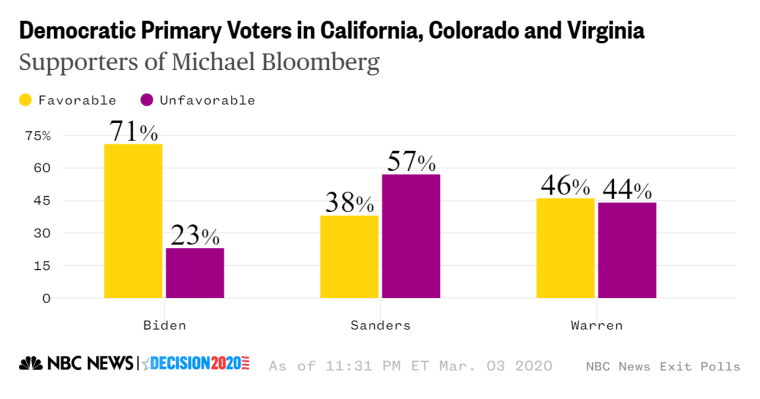
Bloomberg voters in three states — California, Colorado and Virginia — were asked their opinions of the three other major candidates in the race. Only Biden is viewed favorably by a majority of Bloomberg voters: They give him 71 percent favorable and 23 percent unfavorable ratings. Elizabeth Warren is perceived favorably by a slim margin by Bloomberg voters, at 46 percent favorable and 44 percent unfavorable. And Bernie Sanders is highly disliked by Bloomberg's supporters: 38 percent favorable and 57 percent unfavorable.
In polls conducted in 12 of the 14 Super Tuesday states, nearly 1 in 5 Bloomberg voters said they could not guarantee that they would support the Democratic nominee in November regardless of who it is.
NBC News Exit Poll: Later deciders in Oklahoma broke for Biden
According to the NBC News Exit Poll, 50 percent of voters in Oklahoma decided which candidate to vote for only in the last few days. Among these late deciders, 41 percent voted for Joe Biden, while 18 percent opted for Mike Bloomberg, 16 percent for Elizabeth Warren and 15 percent for Bernie Sanders.
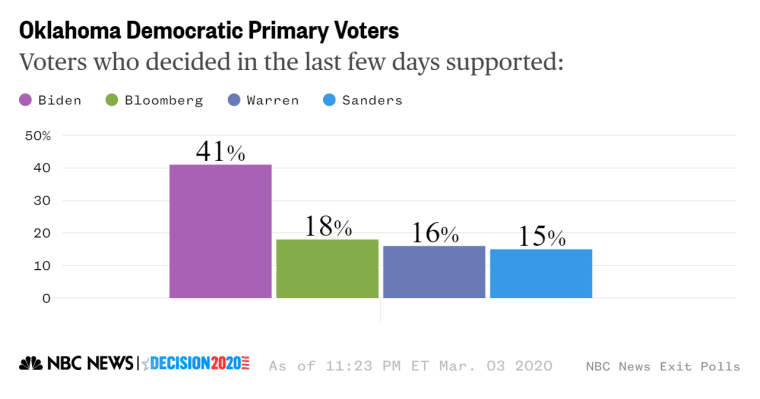
Long lines cause issues in California
Long lines, malfunctioning machines and limited polling staff meant many voters in Los Angeles struggled to cast their primary ballots Tuesday.
Mark Meuser, an election law lawyer, said he waited over an hour to cast his vote. He blames the longer wait times on a new voting system in Los Angeles County.
"The location I am at only has six voting stations and only 1/4 of the allotted staff actually showed up today," Meuser said in a Facebook post.
At the Ace Hotel in downtown Los Angeles, Mallory Brown, 29, told NBC News she waited three hours to vote.
She believes the long wait times were because voters had to wait in two lines, one outside the building and another inside.
"A lot of people just started leaving because they weren't getting updates about how long it would take or what the process was," she said. "People were just getting discouraged, and I saw a lot of people getting out of line as I was waiting."
NBC News Exit Poll: Most states show decline in first-time voters from Super Tuesday 2016
Across seven states conducting presidential primaries on Tuesday that held contests on Super Tuesday four years ago, there’s a dip on average in the share of voters participating in their first presidential primary, results from the NBC News Exit Poll show. That’s dispiriting news for Democrats, who are hoping for a surge of new voters to help power the party to victory in November.
The seven states — Alabama, Massachusetts, Oklahoma, Tennessee, Texas, Virginia and Vermont — all held Super Tuesday presidential primaries on March 1, 2016. The Democratic nomination contest then, as now, featured a spirited competition between well-known candidates.
The share of first-time primary voters is down in five of the states (Alabama, Oklahoma, Texas, Virginia and Vermont), up in Tennessee and flat in Massachusetts. Averaged across the seven states, first-time voters are 15 percent of the electorate in 2020, down from 17 percent in 2016.

NBC News Exit Poll: California voters are more liberal than in 2008
California’s Democratic electorate is more liberal than it was 12 years ago, the last time the state held an early primary. The NBC News Exit Poll finds that two-thirds of voters in Tuesday’s Democratic primary in California describe themselves as liberal. In 2008, only half described themselves this way.
Other key demographics, such as race and gender, are about the same in the 2020 California Democratic primary electorate as they were in 2008. Bernie Sanders won 44 percent of the liberal vote in Tuesday’s California contest, compared to 20 percent for Elizabeth Warren, 17 percent for Joe Biden and 8 percent for Mike Bloomberg, according to the poll.

Hillary Clinton won the last two contested California primaries, by 8 points over Barack Obama in 2008 and by 7 points over Bernie Sanders in 2016. There was no exit poll four years ago when Clinton wrapped up the delegate count the day before the state’s June primary. In 2008, the primary was held in early February when the nomination was still in question.
Most California voters hold positive views of Sanders (70 percent), Warren (67 percent) and Biden (62 percent). Just 32 percent of voters, in contrast, hold a positive view of Bloomberg.
Biden won late deciders by 41-to-30 percent over Sanders. Just 18 percent of California primary voters made up their minds in the last few days; most voters cast their ballots before Tuesday.
ANALYSIS: Biden finds his mojo on Super Tuesday
Talk about finding mojo.
Four days removed from a winless record in the fight for the Democratic presidential nomination, former Vice President Joe Biden barreled through a string of Southern states Tuesday to shovel piles of delegates into a campaign train that launched out of South Carolina on Saturday and has been picking up steam ever since.
"We were told when you get to Super Tuesday, it may be over," Biden told supporters Tuesday night, his voice full of excitement. "Well, it may be over for the other guy."
The centrist's early victories in Virginia, North Carolina, Alabama and Tennessee — fueled by large majorities among African American voters — promised to put him in a strong position to fight Vermont Sen. Bernie Sanders for the right to take on President Donald Trump in November. His better-than-expected showing in New England and along I-35 in the heart of the country threatened to knock Sanders and the progressive wing of the Democratic Party on its heels.
"What we are watching is the voices of African American and other diverse communities being heard loudly around the nation," said Marcus Mason, a Biden donor and former senior director of government affairs for Amtrak. "South Carolina was not a firewall, but a foundation for what was to come."
NBC News Exit Poll: Voters in five states support free college tuition, 'Medicare for All'
Voters across five Super Tuesday states — California, Texas, North Carolina, Tennessee and Virginia — expressed widespread support for free tuition at public colleges and replacing private health insurance with a single payer system, according to NBC News Exit Poll results. Taken together, half of these Democratic primary voters favor both policy proposals, while just 1 in 5 favor neither.
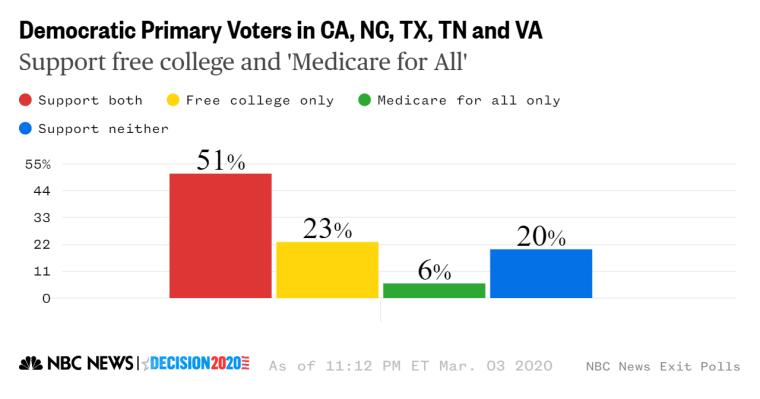
Among those who want both free college and "Medicare for All" as the nation’s only health plan, 49 percent supported Bernie Sanders today. Just 20 percent of this group backed Joe Biden, and 17 percent voted for Elizabeth Warren. But among those who do not support either idea, 44 percent backed Biden, while 23 percent voted for Mike Bloomberg and 9 percent supported Sanders.
Those who want both policy options enacted are more likely to be younger than 45. There is also more support for both proposals among Latino voters than among non-Latinos of any race.
Fully 3 in 4 primary voters who call themselves very liberal back both "Medicare for All" and free college, compared to half of those who are somewhat liberal and just over one-third of moderates and conservatives.
Biden strikes close to Sanders' home, winning Massachusetts
Excited Biden rallies supporters after sweeping Super Tuesday wins
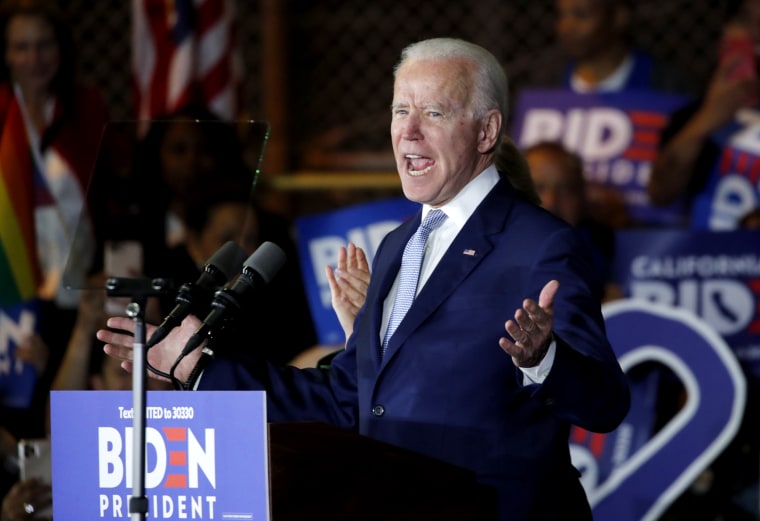
After an initially strong Super Tuesday return, a jubilant Biden addressed supporters saying, "it’s still early, but things are looking awful, awful good."
"For those who have been knocked down, counted out, left behind, this is your campaign!" he said excitedly. "Just a few days ago, the press and the pundits declared the campaign dead. And then came South Carolina, they had something to say about it! And we’re told, well, when you got to Super Tuesday, it’d be over. Well, it may be over for the other guy."
"Tell that to the folks of Virginia, North Carolina, Alabama, Tennessee, Oklahoma, Arkansas, Minnesota and maybe even Massachusetts, it's too close to call!" he continued. "We're still waiting for Texas and California, a few other small states to come in. But it’s looking good! So I'm here to report we are very much alive! And make no mistake about it, this campaign will send Donald Trump packing. This campaign is taking off, join us."
Biden's speech was briefly interrupted as protesters approached the stage, but he continued with his speech undeterred. NBC News projects the former vice president to win Virginia, North Carolina, Alabama, Tennessee, Oklahoma, Arkansas, Minnesota and Massachusetts as political observers await results in delegate-rich Texas and California.
Watch Biden's full remarks here.
How Klobuchar helped secure Biden's Minnesota win
Anti-dairy protesters storm stage during Biden speech
Anti-dairy protesters interrupted Biden's speech to supporters in California.
Two protesters stormed the stage as the former vice president and his wife, Jill Biden, were rallying supporters.
One protester, holding a sign, was taken off stage immediately by what might have been security personnel. Another protester who stormed the stage was swiftly blocked by Symone Sanders, the campaign's senior adviser, as well as volunteers and what also could have been security personnel, and was taken off the stage.
Anti-dairy protesters also interrupted Warren's speech in Houston on Saturday.
'Nearly impossible' for Sanders to stop Biden if delegate gap grows, Todd says
Biden is having such a strong night that he might be unstoppable, Chuck Todd, NBC News' political director, said late Tuesday.
"Joe Biden has already had the night he needs," Todd said on NBC News' special report on Super Tuesday. "It's more likely now that Joe Biden has more delegates at the end of tonight than Bernie Sanders. ... Even with a big Sanders win in California, it is hard to see how it isn't going to turn out that way. If that is the case, if Joe Biden leaves Super Tuesday with more delegates than anybody else, it will be nearly impossible for Sanders to stop him."
NBC News Exit Poll: Two-thirds of Bloomberg voters picked him before recent contest upheaval
Mike Bloomberg has struggled to gain support in the Super Tuesday contests. Those he did persuade skewed older — 4 in 5 of his supporters were age 50 and older, according to the NBC News Exit Poll. They also tilted female (58 percent).
Many of Bloomberg's supporters said they made up their minds before the recent upheaval in the Democratic contest. Two-thirds of Bloomberg’s voters on Super Tuesday said that they made their choice in February or earlier.

Bloomberg overspent Biden with little to show
Bloomberg outspent Biden 60 to 1 on the airwaves in the states that Biden has won so far on Super Tuesday.
Biden spent less than $1 million on television and radio in all of the states he's won so far tonight, data from Advertising Analytics shows.
Biden spent $972,000 on television and radio ads in Alabama, Arkansas, Minnesota, North Carolina, Oklahoma, Tennessee, Massachusetts and Virginia, all states that the NBC News Decision Desk projects he'd win.
Conversely, Bloomberg spent $60.2 million in those states, according to data from Advertising Analytics, an ad-tracking firm.
Out of the states that he's projected to win on Super Tuesday, Biden spent the most in North Carolina — $276,216. Bloomberg spent almost $13 million there.
The former mayor also spent $9.8 million in Massachusetts, which Biden is projected to win.
Biden did not spend a single cent on television or radio ads there.
—This post was updated to reflect Biden's projected victory in Massachusetts.
NBC News Exit Poll: Asian American voters' support tied to preferred candidate
The Asian American population has been growing faster than any other ethnic group, and constitute a growing share of the electorate in key states. They make up about 6 percent of the electorate in the delegate rich state of California, and 2 percent of the electorate in the swing state of Virginia. Securing their support will be important in efforts to win both the Democratic nomination, and the general election in November.
Results from the NBC News exit poll highlight that Asian American voters across Super Tuesday states are the least committed to supporting the Democratic nominee in November, as compared to other racial and ethnic groups.

Among those voting in Super Tuesday states, Sanders is receiving the most support among Asian American voters, with about 39 percent of their votes. Another 21 percent of Asian American voters supported Biden — about 20 percentage points behind Sanders.
A key factor shaping Sanders’ support among Asian Americans was his position on health care, according to results from the NBC News exit poll conducted in 12 out of the 14 Super Tuesday states.
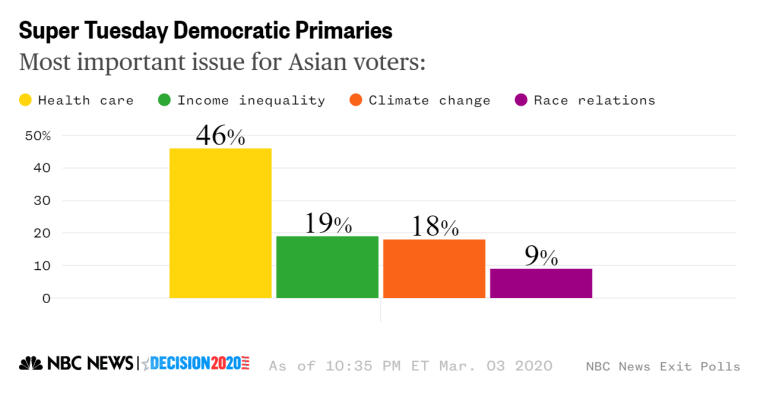
Among these voters, 60 percent supported proposals to replace all Americans’ private health insurance with a single government plan.
Sanders wins Colorado, but Biden, Warren and Bloomberg appear viable to cut into delegates
NBC News projects that Sanders will win Colorado — his first win in the West on Super Tuesday.
Sanders currently has about 36 percent of the vote with 77 percent of the precincts reporting, according to NBC News. But Bloomberg is in second with about 23 percent, Biden has 21 percent and Warren nabbed about 17 percent of the vote. Each of them will peel off delegates from Sanders, which goes to show that while winning a state sounds impressive, it's the delegate chase that really matters in the race for the nomination.
Trump mocks Bloomberg, Warren as Super Tuesday results come in
NBC News Exit Poll: Texas Democratic primary voters skew older than previous years
Democratic primary voters in Texas this year are a bit older than in recent election cycles, according to results from Tuesday's NBC News Exit Poll. Voters age 65 and over constitute about a quarter of Democratic primary voters this year, compared to 18 percent in 2016 and 13 percent in 2008.
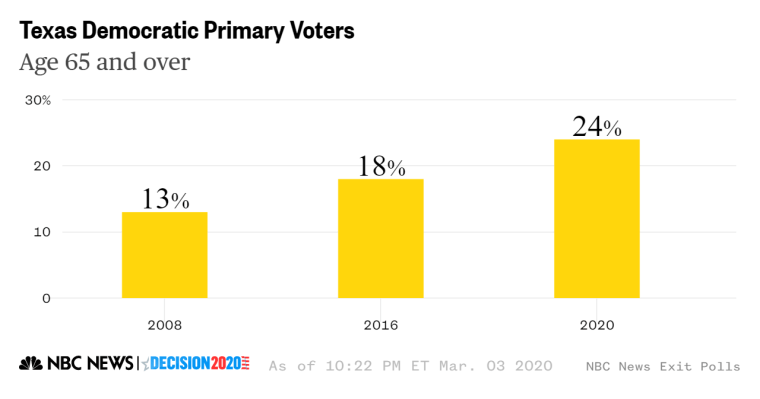
This relatively strong turnout among older Texas Democratic Primary voters stands to benefit Joe Biden, who is winning this group handily, with 46 percent of their vote. He has a 24-point lead in this age group over Mike Bloomberg, who is in second place with this group.
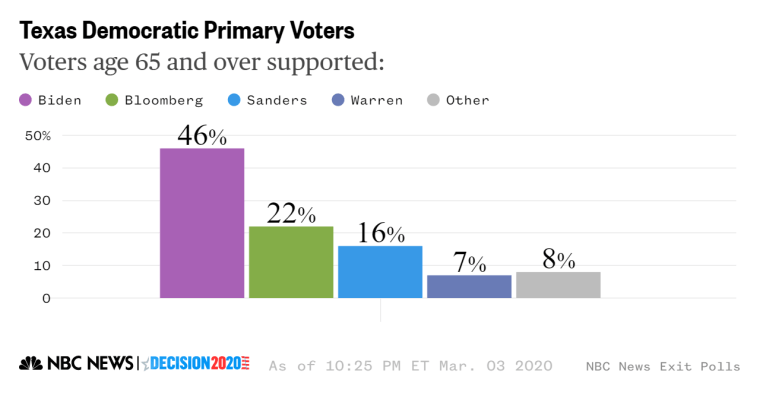
Addressing supporters, Sanders frames race as two-man contest with Biden
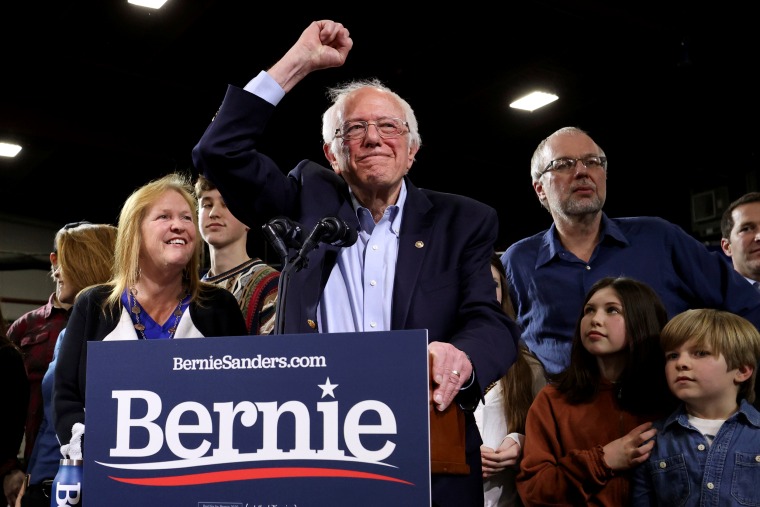
Sanders, speaking to supporters in Vermont, framed the Democratic primary as a two-man race between himself and Biden as both men rack up wins across the country on Super Tuesday and Bloomberg’s and Warren’s respective campaigns fail to have a strong showing so far.
Sanders told his supporters that the race will become "a contrast in ideas." He told the crowd that he voted against the war in Iraq, wants to expand Social Security, has advocated for reforming trade deals and protecting consumers while Biden has done the opposite.
"You cannot beat Trump with the same old, same old kind of politics," Sanders said. "What we need is a new politics that brings working-class people into our political movement, which brings young people into our political movement and which in November will bring the highest turnout in American political history."
Watch Sanders' full remarks here.
NBC News Exit Poll: Biden drew half of the late-deciding vote in Minnesota
The late-breaking suspension of Amy Klobuchar’s bid for the nomination scrambled the race in her home state of Minnesota. NBC News reports Joe Biden is a projected winner in the state.
Joe Biden drew about half of the late-deciding vote in the state tonight. About 2 in 10 voters who made up their minds in the last few days picked Sanders, according to NBC News Exit Polls.
But Minnesota voters are closely divided over the policy direction they want the next president to take. About 4 in 10 are looking for a return to Obama’s policies, while a similar share wants a left-turn ahead. Just 9 in 10 want a more conservative policy direction.
Biden garners a majority of voters looking to return to Obama-era policies, 60 percent, to 15 percent for Biden.
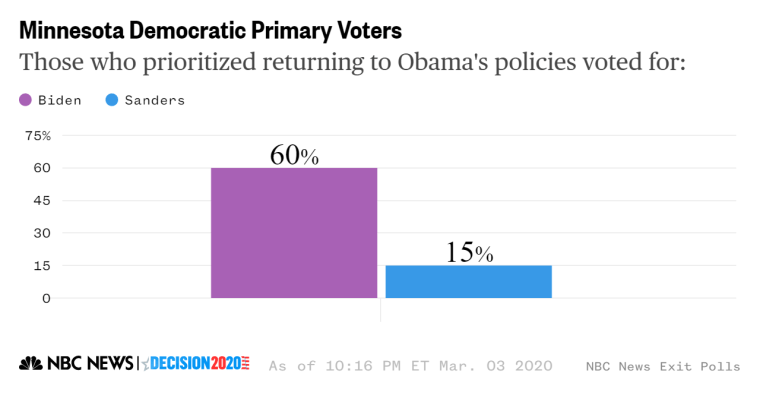
Sanders wins about half of voters looking for a liberal policy turn ahead.
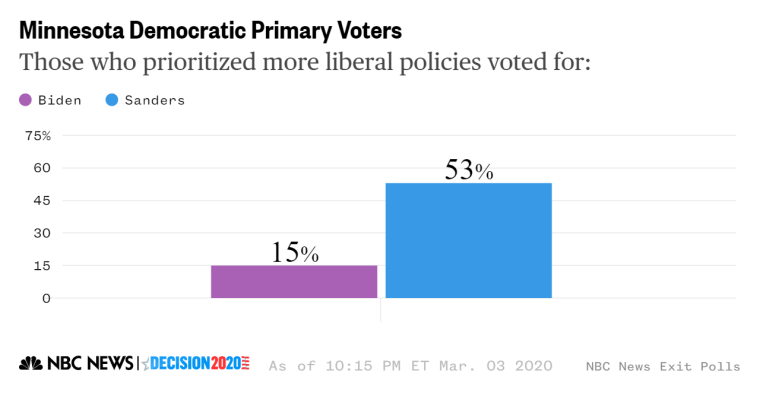
Biden wins Minnesota after home state Sen. Klobuchar drops out, NBC News projects
Joe Biden won Minnesota on Tuesday night, NBC News projected, a day after popular home state Sen. Amy Klobuchar dropped out of the race and endorsed the former vice president.
Biden had won 37 percent of the vote with 43 percent in, while Bernie Sanders had 31 percent. Biden got at least 10 of the state's 75 delegates, and Sanders collected seven.
Klobuchar was leading her home state's presidential primary contest, according to a Star Tribune/MPR News poll last month, and she was trailed by Sanders. Biden was polling in fourth in that survey, with just 8 percent of voters' support. Klobuchar's campaign said its internal polling saw Biden rising into third place in the weekend before the primary.
"I cannot think of a better way to end my campaign than by joining his," Klobuchar said at a Biden rally in Texas.
Read the full story here.
Kellyanne Conway's husband, a vocal Trump critic, donates maximum amount to Biden
NBC News Exit Poll: Liberal and younger Democrats are key in Sanders’ Democratic primary win in Colorado
Bernie Sanders saw strong support from very liberal and younger voters in Colorado on Tuesday, which played a role in his projected win in the state's Democratic primary, according to the NBC News Exit Poll.
Sanders secured support from 54 percent of very liberal voters and from 50 percent of those under age 45. Sanders also did well with non-white voters and those without college degrees.

In addition, Sanders received support from voters who enthusiastically embrace his position on issues. Nearly half of voters who think the next president needs to change to more liberal policies voted for Sanders, as did 45 percent of those who believe it's most important for the Democratic nominee to be an agent of change, 43 percent who think the U.S. economic system needs a complete overhaul and 41 percent who said the issue that mattered most to them was income inequality.
NBC News Exit Poll: Biden favored by voters who prioritize beating Trump, issue voters back Sanders
Six in 10 voters in today’s Democratic presidential primaries care most about nominating a candidate who can beat Donald Trump in November, according to the NBC News Exit Poll conducted in 12 of 14 Super Tuesday states across the country. These voters favor Joe Biden over his more liberal rival Bernie Sanders by a margin of 36 percent to 25 percent.
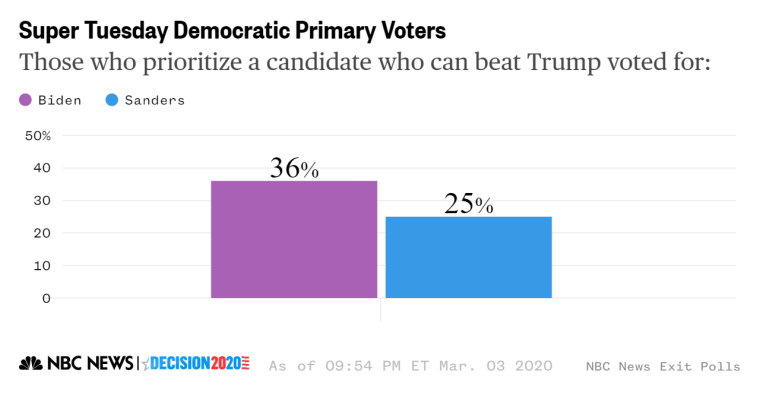
By contrast, about a third of Super Tuesday voters say they’d rather see the Democrats nominate a candidate who agrees with them on major issues. Sanders is the clear favorite of these voters over Biden, 45 percent to 24 percent.
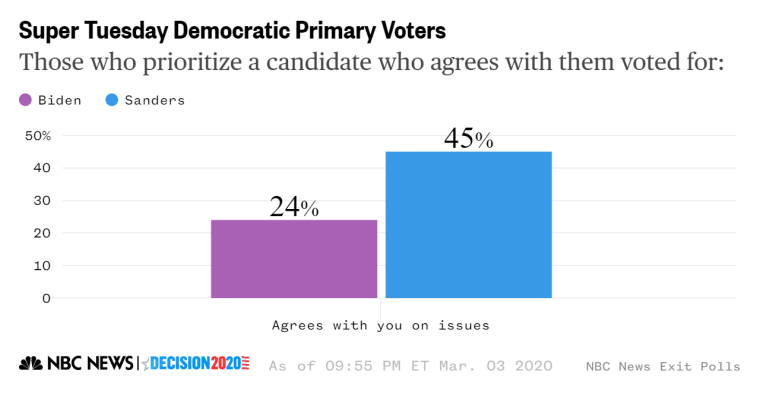
How is the Sanders campaign feeling?
A source within the Sanders campaign says they are "absolutely" surprised by the results out of North Carolina. This is a state where campaign officials were optimistic because they saw it as his best performing Southern state in 2016 (he still lost by double digits.)
Sanders had television ads airing in North Carolina media markets even before the South Carolina contest. In addition to the four separate trips and many stops Sanders made there, his surrogates including Nina Turner and Donald Glover spent significant chunks of time in the state.
This was one the campaign thought it could win. When this source was asked if this also was affected by Rep. James Clyburn’s endorsement, we were told: "His force is evident."
The Sanders campaign believes it's still early to panic as some polls are still open nationally.
Sanders spokesman Mike Casca tells NBC News, "If you turn off your television at 10 p.m. tonight, you will wake up tomorrow to a different race."
Campaign manager Faiz Shakir came out to speak to the now-thinning crowd.
"We are having a good night, and it’s only going to get better," Shakir said.
NBC News Exit Poll: Moderate and older Democratic voters boost Biden in Oklahoma primary
Voters who want to unite the country and return to former President Barack Obama's policies propelled Joe Biden to a projected victory in the Oklahoma Democratic primary, according to results from the NBC News Exit Poll.
Biden beat Bernie Sanders, the second-place finisher, among both men and women, white voters and non-white voters, and voters age 45 and older. Biden also did well with moderates, securing 46 percent of their votes.
And Biden had significant support among voters who placed importance on a candidate who can unite the country, those seeking a return to Obama's policies and those who consider health care their top issue.

NBC News Exit Poll: Biden voters want a uniter, Sanders voters want change
The NBC News Exit Poll finds Biden voters and Sanders voters prizing very different candidate qualities.
When asked which of four candidate qualities mattered most to them, roughly half of Biden voters in Super Tuesday Democratic primaries said that they prefer a candidate who can unite the country. About one quarter of his voters most want a candidate who can bring needed change, and another 4 percent say it matters most that the candidate is a fighter.

With Sanders voters, the pattern is largely reversed: A plurality (49 percent) say they most want a candidate who can bring needed change, while just 17 percent say that uniting the country matters most. Another 23 percent of Sanders voters in Super Tuesday states prize a candidate who cares about people like them.
Warren voters, for their part, express preferences that are similar to Sanders voters: A majority say it’s most important to have a candidate who can bring needed change.
Sanders wins Colorado, NBC News projects
NBC News Exit Poll: Colorado Democrats think economic system needs 'complete overhaul'
According to the NBC News Exit Poll, there is strong support among Colorado Democratic primary voters for a “complete overhaul” of the U.S. economic system.
Just less than half of Colorado Democrats believe the U.S. economic system needs significant restructuring, while 43 percent think the system needs only "minor" changes. A mere 5 percent of Colorado Democrats think the U.S. economic system "works well enough as is."

NBC News Exit Poll: Biden waltzes out of Tennessee with a win
Tennessee voters have kept Joe Biden’s Southern streak unbroken so far tonight. The NBC News Exit Poll finds that 62 percent of black voters in Tennessee backed the former vice president in today's primary.
He also won majorities among military veterans, moderates and conservatives as well as voters 45 and older. These results reflect his strengths in other Southern states voting on Super Tuesday.

NBC News Exit Poll: Nearly 4 in 10 Warren voters are white women with a college degree
At least two-thirds of voters for Elizabeth Warren on Super Tuesday are white women, self-identified liberals or college graduates, according to results from the NBC News Exit Poll. Nearly 4 in 10 Warren voters in the Democratic primaries across Super Tuesday states are white women with a college degree.

But in a nomination race in which many voters are focused on ousting an incumbent president, few Warren voters signal that she would be the only acceptable candidate. Nine in 10 Warren voters on Tuesday say they will vote for the Democratic nominee in November, with or without Warren on the ballot.
NBC News Exit Poll: Latinos are boosting Sanders in Texas
Four years ago, Bernie Sanders was blown out in Texas, losing to Hillary Clinton by more than 30 points. But thanks to substantial improvement among Latino voters this Super Tuesday, Sanders is putting in a much stronger showing in the state, according to results from the NBC News Exit Poll.
Sanders’ vote share among Latino Democratic primary voters in Texas has improved 12 points, from 29 percent in 2016 to 45 percent this year. His support among black primary voters in Texas stayed nearly the same, going from 15 percent of the black vote in 2016 to 18 percent in 2020.
Sanders' support among white Texas Democratic primary voters has ticked down somewhat from 41 percent to 32 percent, though he does have a narrow lead over Biden among white primary voters in Texas.
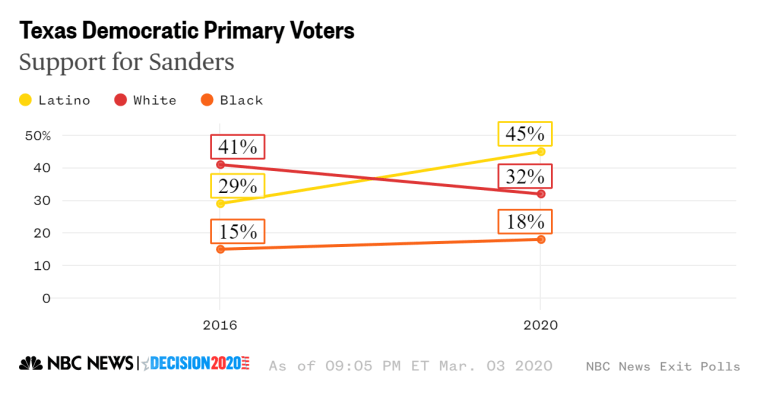
Sanders’ appeal among Latinos is tied to his health care platform. Latinos in Texas are more likely than whites or blacks to name health care as the issue that matters most to them. And among those citing health care as their main issue, Latinos express the highest level of support for Sanders’ plan to replace all private health insurance with a single government plan for everyone.
About three-quarters of Latino primary voters in Texas focused on health care support "Medicare for All." That's compared to about six in 10 whites and blacks focused on health care.
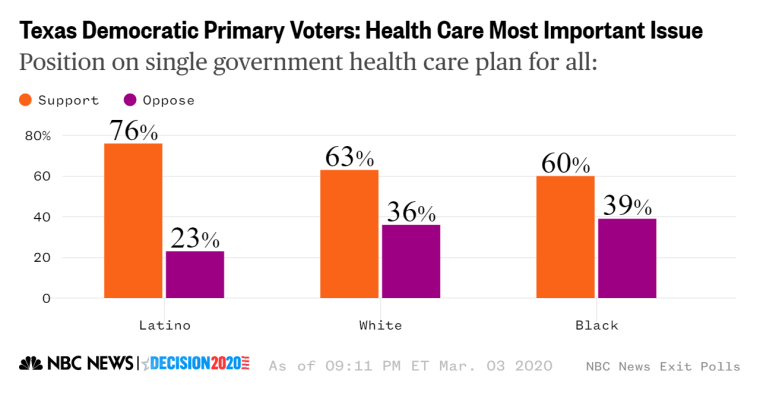
Biden takes Tennessee, NBC News projects
Biden heads to Obama Boulevard for Super Tuesday results
Long lines to vote in Texas
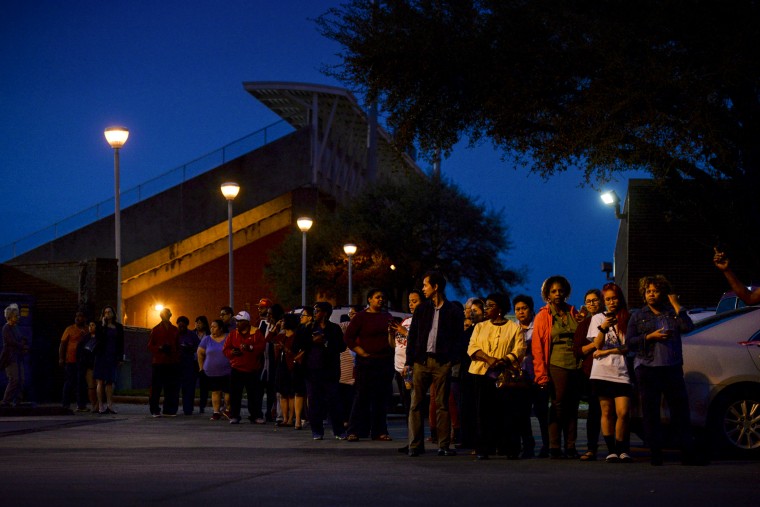
NBC News Exit Poll: First-time Democratic primary voters favor Sanders
Bernie Sanders is the clear favorite of those voting in their first Democratic presidential primary on Tuesday, according to results from the NBC News Exit Poll conducted in nine of the 14 Super Tuesday states. But new voters represent a relatively slim share of Tuesday’s electorate.
Sanders received support from 43 percent of first-time voters, leaving Joe Biden, Elizabeth Warren and Mike Bloomberg far behind.
But these new voters make up just 13 percent of those voting in Democratic primaries Tuesday. That's much lower than the share of first-time participants in last month’s Iowa and Nevada caucuses, but roughly on par with the percentages of new voters in the New Hampshire and South Carolina primaries.
Among those who’ve voted in a Democratic primary before, Biden has a slim lead over Sanders.

Bloomberg says Super Tuesday will be a success regardless of results
WEST PALM BEACH, Fla. — At his Super Tuesday event, Bloomberg said that "no matter how many delegates we win tonight, we've done something no one else thought was possible."
"In three months, we went from 1 percent to being a contender for the Democratic nomination," he continued.
So far, the early returns on Tuesday did not appear as good for Bloomberg as he had hoped. Bloomberg bypassed the first four states, first appearing on ballots Tuesday.
He said earlier Tuesday that his only plausible path to the nomination was through a contested convention. His campaign manager, Kevin Sheekey, would say later in the day that he did not think the Democratic nominating process would reach that point.
"We proved we can win the voters who will decide the general election," Bloomberg said in his speech.
He additionally went after Trump and promoted his policy agenda on gun control, climate change and abortion rights. Near the end of his address, the crowd went wild when he said he'll never tweet from the Oval Office as president.
Sanders may have a turnout problem
'Barry O' finally endorses Biden
NBC News Exit Poll: Bloomberg fails to win over key constituencies
Results from the NBC News Exit Poll find Mike Bloomberg lagging behind Joe Biden among his core constituencies.
Despite campaigning on his viability in the general election, Bloomberg is winning just 13 percent of Democratic primary voters who say they would prefer a candidate who can beat Trump over one who agrees with them on major issues. Bloomberg is also struggling to gain traction among college graduates, older voters, and independents — capturing about 11 percent to 17 percent of voters within each of these groups.
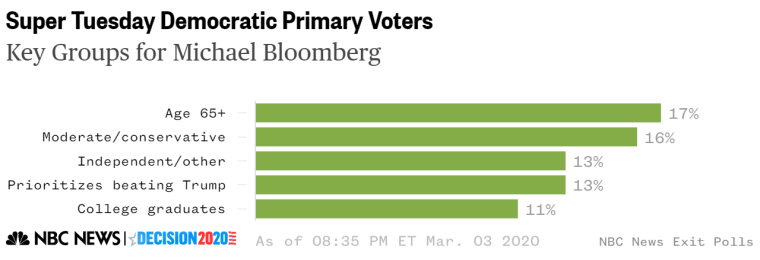
Bloomberg is pulling in about one in six self-described moderate or conservative Democratic voters in the 12 Super Tuesday states where exit polling was conducted. The plurality of these voters, 42 percent, are going for Biden.
Ad spending breakdown for Virginia and N.C.
NBC News Exit Poll: Voters concerned about coronavirus support Biden on Super Tuesday
The coronavirus outbreak was on many Democratic voters' minds as they went to the polls on Super Tuesday. In five states covered by the NBC News Exit Poll — California, North Carolina, Tennessee, Texas and Virginia — just over half of primary voters said that the coronavirus was an important factor in their vote. The figure ranged from 51 percent in California to 61 percent in Texas.
Across the five states, 67 percent of voters ages 45 and over said the coronavirus was an important factor, while just 33 percent of those under age 45 felt the same. Joe Biden was the candidate of choice of nearly half of those who rated the outbreak as an important factor, followed by Bernie Sanders.
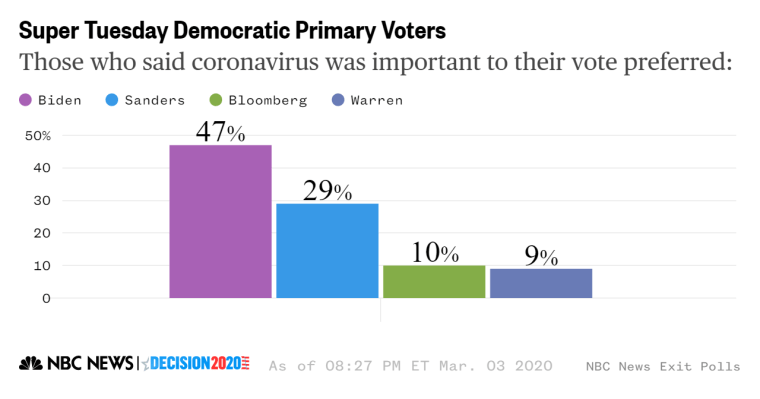
NBC News Exit Poll: Klobuchar seen favorably by most Minnesota Democratic primary voters
Eyes are on Minnesota tonight and its 75 pledged delegates after home state Sen. Amy Klobuchar suspended her campaign on Monday and offered her endorsement to Joe Biden.
Klobuchar is well-liked. About three-quarters of Minnesota’s Democratic primary voters so far today have a favorable opinion of her. But she faced competition for the nomination from fellow moderates and she needed to make inroads among the majority liberal Democratic primary voters on her home turf. (In Minnesota, 68 percent of Democratic primary voters are liberal, and 32 percent are moderate or conservative.)
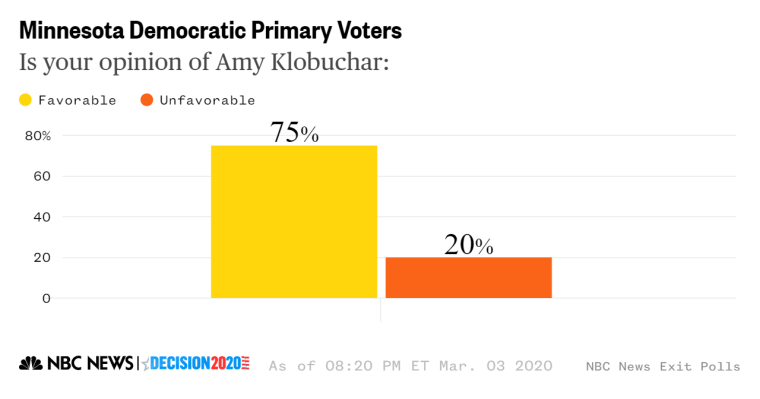
Nine in 10, or 92 percent, of those backing Biden in Minnesota tonight have a favorable view of Klobuchar. Meanwhile, 73 percent of Bloomberg voters in Minnesota, 80 percent of Warren voters and 52 percent of Sanders voters in the state see Klobuchar in a favorable light.
Bloomberg rally erupts in cheers after he's declared winner... of American Samoa
WEST PALM BEACH, Fla. — The crowd at Bloomberg's Super Tuesday event here gave a rousing cheer when the candidate was declared the winner in the American Samoa caucuses.
NBC News declared Bloomberg the victor in American Samoa. It was his first victory in a presidential contest.
NBC News reporting from around the country
NBC News Exit Poll: Late-deciding Super Tuesday voters break heavily for Biden
Joe Biden is garnering nearly half the support of Democrats who picked a candidate in just the last few days before Super Tuesday, according to early results from the NBC News Exit Poll conducted in 12 of the 14 Super Tuesday states.
Riding a wave of endorsements from former rivals and his landslide victory in Saturday’s South Carolina primary, Biden was favored by 47 percent of Super Tuesday voters who said they picked a candidate in the last few days. He left Bernie Sanders, Elizabeth Warren and Mike Bloomberg far behind with these late-deciding voters.

By contrast, Sanders built a comfortable lead over Biden, 37 percent to 25 percent, among voters who picked a candidate earlier than the last few days.
Late-deciding voters made up more than a quarter of the Super Tuesday electorate, exit poll results show.
Long line as poll closes in Dallas
NBC News Exit Poll: Oklahoma Democratic primary voters say Biden has best chance of beating Trump
More than half of Democratic primary voters in Oklahoma say they would prefer a nominee who can beat President Donald Trump over one who agrees with them on major issues, according to results from the NBC News Exit Poll.
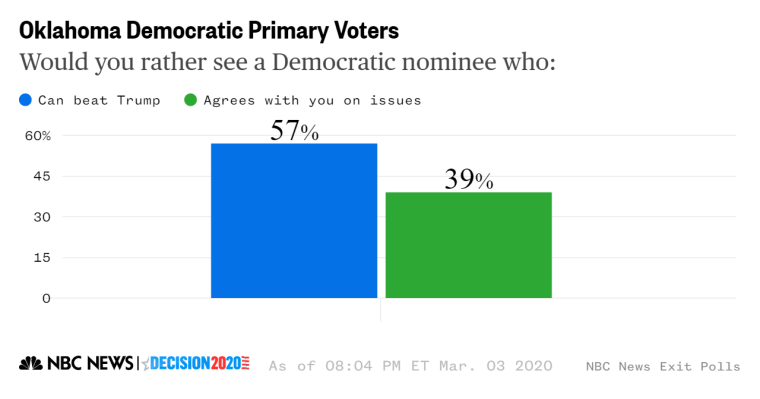
When asked which candidate has the best chance to defeat Trump in November, more than 4 in 10 Oklahoma Democratic voters named Joe Biden, while 1 in 4 said the same of Bernie Sanders. Only 16 percent said Mike Bloomberg has the best chance of winning against Trump and fewer had confidence in Elizabeth Warren.
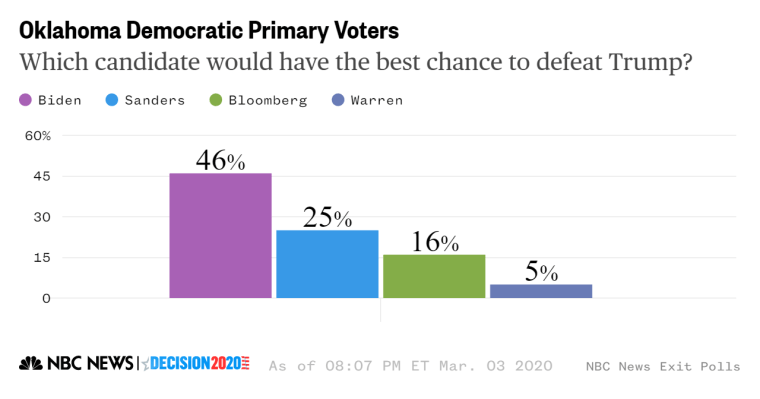
As of 8 p.m. ET, NBC News has listed the Oklahoma Democratic primary as too close to call.
Regardless of who the Democrats nominate, 78 percent of Oklahoma Democrats report they will support that candidate.
Biden reacts to Virginia win
NBC News Exit Poll: Biden pulls in resounding win in Alabama
Joe Biden’s popularity among black voters in the South is on full display, especially in Alabama, the state with highest proportion of black voters on Super Tuesday.
The NBC News Exit Poll finds that 72 percent of black voters in Alabama backed the former vice president, outpacing his 61 percent support in South Carolina. But he also won a clear victory among white voters, doing significantly better than Saturday, when he won one-third of white voters.

Bernie Sanders was a distant runner-up. His best performance was 38 percent support among voters under 45 years old, but this group only made up three in 10 primary voters in Alabama today.
Biden wins Alabama, NBC News projects
NBC News Exit Poll: Biden's support among black voters weaker outside South
Joe Biden is performing well among black voters on Super Tuesday in the Southern states of Alabama, North Carolina, Oklahoma, Tennessee, Texas and Virginia, just as he did in Saturday's South Carolina primary, according to results from the NBC News Exit Poll. About 62 percent of black voters in these states support Biden, while 18 percent of black voters in these states support Bernie Sanders.
Outside of these states, however, support for Biden among black voters is weaker. In California, Colorado, Massachusetts, Maine, Minnesota and Vermont, black voters are about half as likely as those in the South to support Biden.
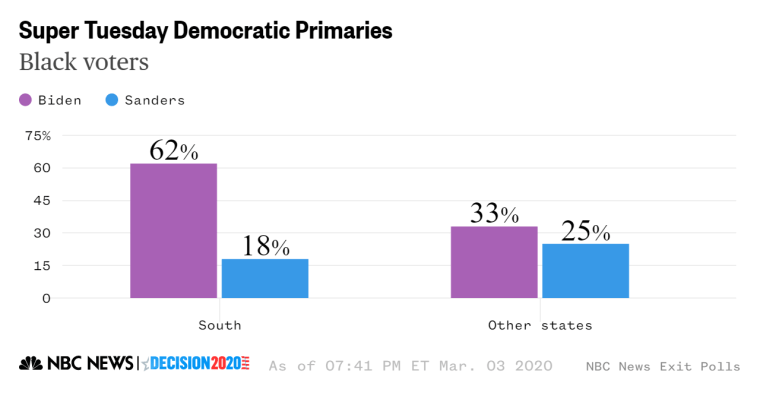
In addition to this regional divide among black voters, there is a division by age. Black voters under 45 are about three times as likely to support Sanders than those 45 and over. Older black voters are nearly 30 percentage points more likely to support Biden than Sanders.

NBC News Exit Poll: Black Democrats in North Carolina want a return to Obama-era policies
Black voters in today’s North Carolina Democratic primary want the next president to return to Barack Obama’s policies, early results from the NBC New Exit Poll show.

By contrast, white Democratic primary voters in the state are more divided — a plurality (44 percent) favor returning to Obama’s policies but 41 percent would like to move to more liberal policies.
About 1 in 10 primary voters in both groups think the next president should change to more conservative policies.
Bloomberg campaign will 'take another look' after Super Tuesday results
Publicly, the Bloomberg campaign is projecting confidence tonight, with campaign manager Kevin Sheekey MSNBC last hour that they are "absolutely not" worried about Bloomberg being a spoiler and that their internal polling shows Bloomberg being viable in most, if not all, the states at play tonight.
But privately, Bloomberg campaign officials are far less optimistic. They are acknowledging that Biden is poised to do extremely well tonight and say their data shows that a large number of voters made up their minds last-minute, which almost surely helps Biden.
Bloomberg officials are acknowledging that Bloomberg will re-assess on Wednesday after the data is in whether to stay in the race. Although they are casting that as par for the course for any candidate after his first contest on the ballot, this is a changefrom what Bloomberg had said as recently as the weekend: That he planned to say in even if he didn’t place in the top three on Super Tuesday.
Just a few hours ago in Miami, Bloomberg was defiant, saying Biden is taking votes away from him and that he’s "in it to win it," even if that means a contested convention.
Warren signals she will fight on: 'The pundits have gotten it wrong, over and over'
Warren, in a speech to supporters in Detroit, made the case for her candidacy on Super Tuesday as Biden’s resurgent campaign attempts to pre-empt Sanders, the current front-runner, and pundits have claimed the Massachusetts senator has no pathway to the Democratic nomination.
"They're playing games about prediction and strategy," she said. "But prediction has been a terrible business, and the pundits have gotten it wrong, over and over."
She added, "So here’s my advice: cast a vote that will make you proud; cast your vote from your heart — and vote for the person you think will make the best president."
Warren has had strong debate performances and raised a notable amount of campaign contributions, but has consistently performed poorly in the early Democratic contests. Her campaign has signaled that she will compete beyond Super Tuesday and her speech in Detroit touched on her theme of being a fighter and her determination to defeat Trump and work on behalf of working-class Americans.
She told the story of when her father had a heart attack when she was a young girl. The family lost its station wagon and almost lost their home. That is when her mother got a minimum-wage job for the income. She said she learned lessons from that that translated to her work on bankruptcy law consumer protection.
"You don’t get what you don’t fight for — and I am in this fight," she said.
NBC News Exit Poll: Health care is top concern of voters
Long an issue owned by the Democratic Party, health care topped the list of issues named by Democrats as mattering most to their vote today, according to the NBC News Exit Poll conducted in 12 out of 14 Super Tuesday primaries across the country.
Four in 10 voters named health care as their most important concern, well ahead of three others: climate change, income inequality and race relations.
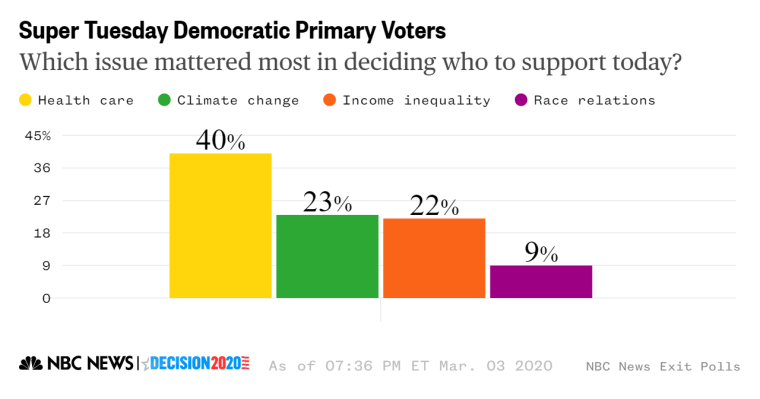
Health care voters were equally likely to favor Joe Biden as Bernie Sanders.
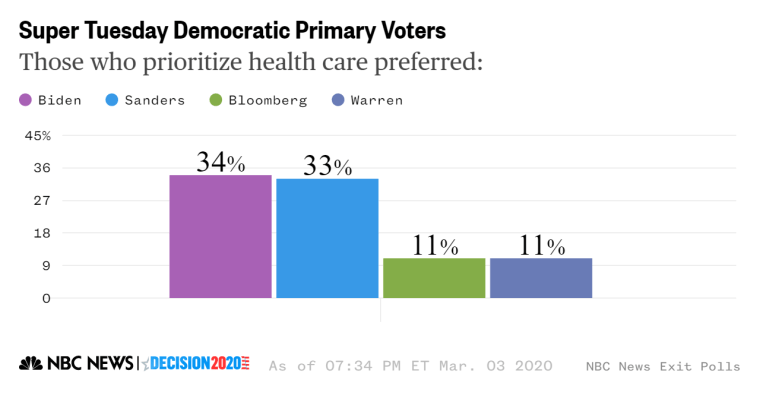
Hayes: Clyburn's Biden endorsement made a huge difference
Hayes: Clyburn's Biden endorsement made a huge difference
NBC News Exit Poll: Black voters propel Biden's North Carolina win
Joe Biden won the North Carolina Democratic primary on Tuesday, repeating his success in South Carolina's primary on Saturday. In both states, he rode a wave of support from black voters.
While black voters constitute a smaller share of North Carolina’s Democratic electorate (27 percent) than South Carolina’s (56 percent), Biden performed just as strongly among North Carolina's black voters on Tuesday, according to early findings from the NBC News Exit Poll.
On Saturday, Biden won about 6 in 10 black voters in South Carolina, and on Tuesday he received a similar share, 63 percent, in North Carolina.

NBC News Exit Poll: Bloomberg peeling off about 1 in 6 moderate Democratic voters
With both Pete Buttigieg and Amy Klobuchar suspending their campaigns, Joe Biden and Mike Bloomberg are left vying for moderate Democrats in the Super Tuesday contests.
According to early results from the NBC News Exit Poll, this contest within the contest is not particularly close as Biden has a 21-point lead over Bloomberg among moderate or conservative Democratic primary voters across the 12 Super Tuesday states that were polled. At present Bloomberg is even polling slightly behind Bernie Sanders among moderate and conservative Democrats.
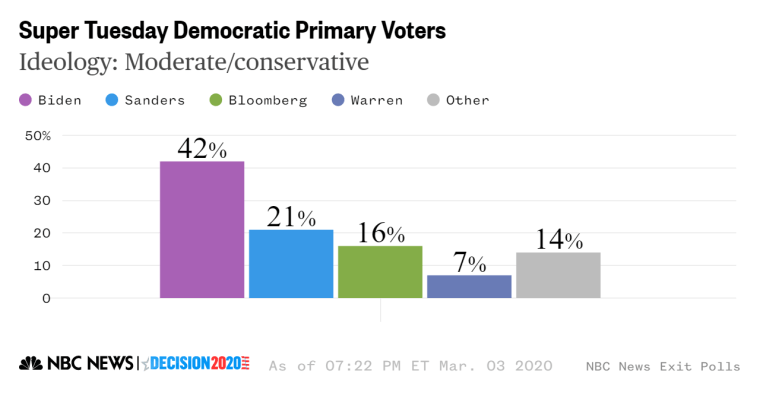
While controversy over stop-and-frisk policing and his conduct toward women in the workplace have dogged Bloomberg, his level of support among women versus men, and black voters versus white voters, are very similar. According to the early results from the NBC News Exit Poll in 12 Super Tuesday states, Bloomberg is bringing in about 11 to 14 percent of voters regardless of race or sex.

Tiny Biden 'spokesperson' urges to go out and vote
Tennessee extending voting hours due to tornado damage
Deadly tornadoes knocked out polling places in Tennessee while fears over the coronavirus left some polling places in California and Texas short of election workers as Super Tuesday voting was underway around the country.
In response, the state said that polling sites across the state would stay open until 9 p.m. ET (many were set to close at 8 p.m. ET) and five sites in Davidson County, where some locations were damaged or destroyed, would stay open until 10 p.m. ET.
NBC News Exit Poll: Sanders wins Vermont with young, liberal voters who want change
Bernie Sanders won the Democratic primary in his home state of Vermont Tuesday with support from a broad coalition of voters — including those who would like a candidate who can bring about change, very liberal voters and those under 45, according to results from the NBC News Exit Poll.

A majority of Sanders' supporters in Vermont say they will vote for the Democratic nominee this November, regardless of who ends up on the ballot. Still, 16 percent would not commit to voting for the party’s nominee.

Biden stops for a sweet treat in LA
Millions voted early — and some wasted their ballots on candidates who quit
For the first time, early voting will play a significant role in the Super Tuesday primaries this year. In four states — California, Colorado, Texas and Utah — early and absentee ballots are expected to be at least half of the total vote.
The total number of early votes cast in the Democratic primaries for Super Tuesday contests is 4 million, according to figures as of Monday provided by TargetSmart, the National Election Poll, and secretaries of state, and analyzed independently by NBC News.
That total includes 1.6 million in California, where 415 delegates are at stake, or 30 percent of the Super Tuesday total.
Many of those voters, however, cast their ballots before the withdrawals of three of the candidates: Pete Buttigieg, Amy Klobuchar and Tom Steyer. That led to frustration on the part of some of their supporters on Monday and Tuesday when they learned that their early votes had been wasted on candidates who were no longer in the race. (In almost all states, an early vote is final once it is cast.)
Read the full story here.
Bloomberg campaign manager throws cold water on contested convention talk
WEST PALM BEACH, Fla. — Bloomberg's campaign manager said he doesn't think it's likely the Democrats will have a contested convention this summer — hours after the billionaire contender told reporters he sees that as his only plausible path to victory.
Speaking to reporters ahead of Bloomberg's Super Tuesday rally here, campaign manager Kevin Sheekey said: "I don't happen to think Democrats will have a contested convention."
Bloomberg's top aide said "absolutely not" when asked if Bloomberg would be ending his candidacy Tuesday, saying "we'll see" what the future holds for his campaign following the elections in more than a dozen states and territories.
"I expect him to be above the 15 percent threshold in just about every state," he said, adding that "anyone who's expecting the kind of night where they can go home and go to sleep early should forget about it."
At a Miami field office earlier Tuesday, Bloomberg said of a contested convention: "Well, I don't think that I can win any other ways."
His remarks come as Biden has started to consolidate the moderate Democratic primary field aimed at taking on Bernie Sanders, with Bloomberg facing increased calls to join Buttigieg and Klobuchar, who ended their candidacies this week and backed Biden.
NBC News Exit Poll: Widespread favorability propels Biden to Virginia win
Polling taken in the weeks before the South Carolina primary suggested that Virginia could be a very close contest, but it didn't turn out that way in the end.
Joe Biden rode a wave of widespread popularity to victory, according to the NBC News Exit Poll. His 67 percent favorable rating in Virginia is significantly higher than the same rating for Elizabeth Warren, Bernie Sanders or Mike Bloomberg.
Black voters provided a significant chunk of the former vice president’s support in Virginia. Biden won 63 percent of this group compared with 17 percent who backed Sanders. He also won solid majorities among those 45 years old and over as well as moderates and conservatives.

Other components of Biden’s support included Virginia primary voters who want the country to return to the policies of Barack Obama. They gave Biden 75 percent of their vote. He also won 67 percent of voters who were looking for a candidate who can unite the country.

NC extends voting for 2 precincts
NBC News Exit Poll: Democratic voters think favorably of socialism in 4 Super Tuesday states
In four states, more Democratic primary voters on Super Tuesday said they had a favorable view of socialism than an unfavorable view, according to results from the NBC News Exit Poll.
Socialism was viewed favorably by a wide margin by Democratic voters in both California and Texas. It was favored by slimmer margins among Democrats in North Carolina and Tennessee.
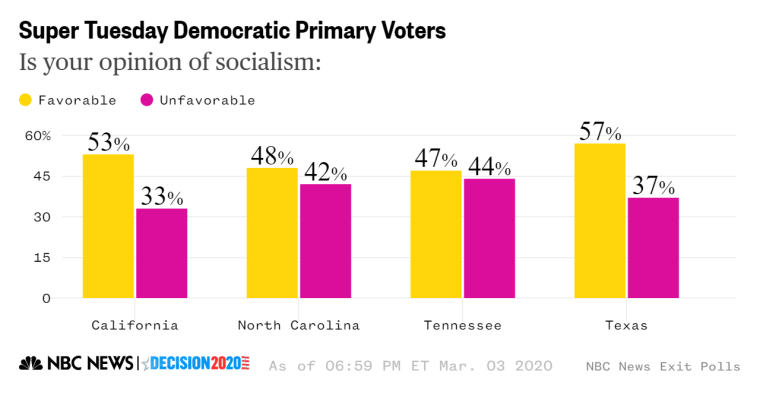
Biden wins Virginia, Sanders takes Vermont, NBC News projects
Joe Biden has won the Virginia Democratic primary and Bernie Sanders has come out on top in his home state of Vermont, NBC News projects, as the first polls close on Super Tuesday.
Voting is taking place in 14 states, including delegate-loaded Texas and California, where polls don’t close until 11 p.m. ET. The goal of the Democratic presidential primary is to amass delegates to capture the nomination, not popular votes, and winning states does not necessarily mean a candidate will win the most delegates.
NBC News Exit Poll: Younger voters decidedly more liberal than those older
Younger voters catapulted Bernie Sanders into the national limelight in 2016 and their support remains a key factor in the senator’s prospects for the Democratic Party nomination.
Younger voters across today's Super Tuesday contests are decidedly more liberal than their elders. Roughly four in 10 call themselves very liberal, compared with about a quarter of voters 30 and older.
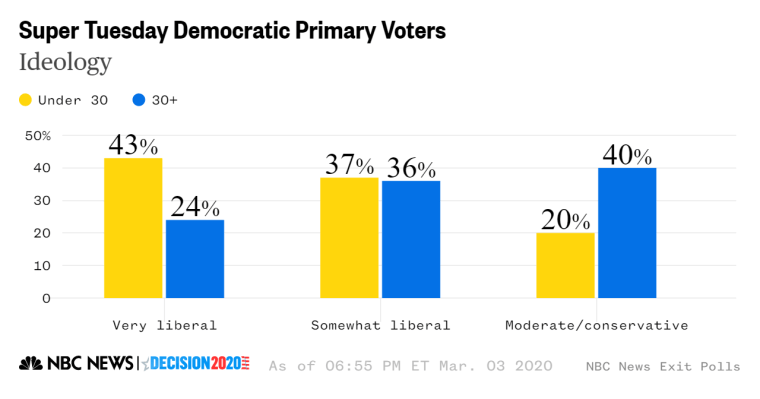
Two-thirds of the Democratic parties’ youngest voters across Super Tuesday states so far tonight, 68 percent, are looking for the next president to move policies to the left, and only 23 percent of this group says they want a return to Obama era policies.
But both groups bring a mix of issue concerns to the ballot box. About a third of voters younger than 30 name health care as the most important issue in their vote today, as do 40 percent of those ages 30 and older.
NBC News Exit Poll: Colorado Democrats view Warren most favorably and Bloomberg least
More than 7 in 10 Colorado Democratic primary voters hold a favorable opinion of Elizabeth Warren, according to early results from the NBC News Exit Poll on Tuesday. That's higher than the favorability ratings for Joe Biden (63 percent) and Bernie Sanders (63 percent).
Mike Bloomberg was viewed less positively than the other Democratic candidates in Colorado, with 52 percent viewing him unfavorably, according to the poll results.
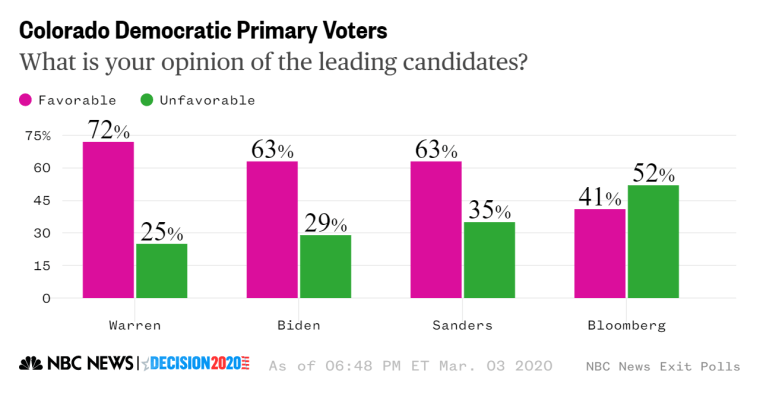
Pete Buttigieg and Amy Klobuchar, who suspended their campaigns and endorsed Biden in the past two days, are also viewed positively by a majority of Colorado Democrats, 62 percent and 60 percent, respectively.
NBC News Exit Poll: How voters in five southeastern states break down on race, ideology
A lot of attention is focused on California and Texas as the two biggest prizes in the primary calendar. But 393 pledged delegates, or nearly 3 in 10 of those up for grabs on Super Tuesday, will come from six southeastern states voting today. These voters look different from the rest of the pack, according to early NBC News Exit Poll results in five of those six states: Alabama, North Carolina, Oklahoma, Tennessee and Virginia. These differences could impact the overall results for the night.
In some ways, the southeastern states look a lot like Texas. For example, they tend to have more moderate and conservative voters in their Democratic primary electorate — 45 percent in the five Southeast states and 41 percent in Texas — than California does.
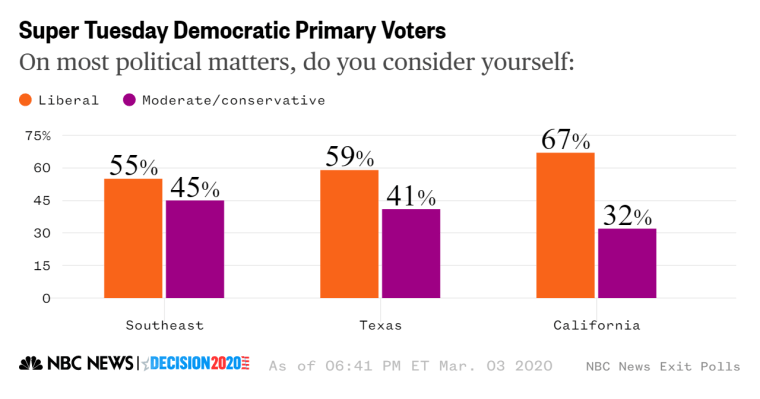
The southeastern states differ from both these large states in their racial makeup with a larger black electorate, 27 percent overall, than either Texas, 20 percent, or California, seven percent. But those states have relatively few Latino voters in comparison.
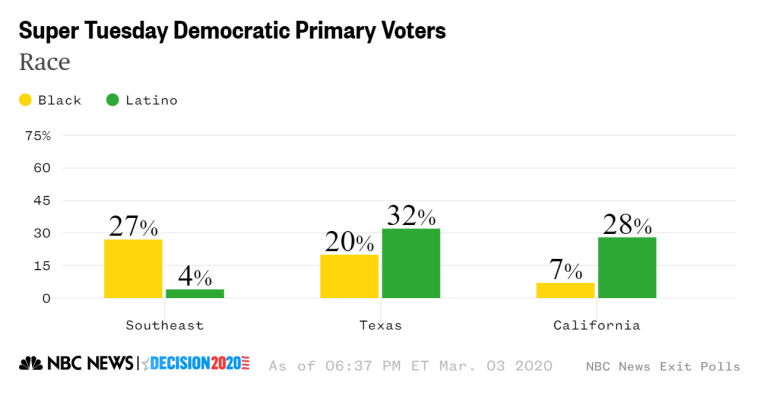
Texas progressives holding out hope for a Sanders win
HOUSTON — Progressive voters in Texas say they feel good about Sanders' chances despite Biden's win in South Carolina and Monday's endorsements from ex-candidates Buttigieg, Klobuchar and Beto O'Rourke.
"I don’t believe that’s going to have an actual impact," said Stevens Orozco, a teacher who is part of a wave of young progressive candidates running for Congress against Democratic incumbents. "At the grassroots level, all of the real excitement and momentum is for Bernie, and I absolutely believe he can still win Texas."
Orozco, 33, is challenging Rep. Sheila Jackson Lee, a 13-term Democrat who was elected to Congress when Orozco was 8. Although Jackson Lee, 70, is regarded as one of the most liberal members of Congress from Texas, Orozco spent Tuesday urging Democratic to vote for change.
Manny Edwards, a 20-year-old University of Houston student who was voting in his first presidential primary, said he and most of his friends were backing Sanders and other progressive candidates.
"Bernie is the only candidate who actually stands for something, and that's why he's going to win," said Edwards, noting that some of his family members lacked health insurance. "I don't think it's radical that everyone should be able to have health care."
Michael Saldana, 26, said he was annoyed by those who've argued that Sanders wouldn't fare well in the general election. After seeing friends' homes destroyed in Hurricane Harvey in 2017, he said he was supporting candidates who supported the aggressive efforts to combat climate change.
"I think Sanders can get it done," he said.
Robocalls in Texas push wrong day for Democratic primary
Robocalls falsely telling Texas voters that the state's primaries were scheduled for Wednesday, and not Tuesday, were reported several times to the Texas secretary of state on Tuesday.
Stephen Chang, director of communications for Secretary of State Ruth Hughs, said the calls claimed that “R’s, D’s and I’s vote tomorrow.”
Chang said authorities are being “proactive" in addressing the calls but did not specify what was being done. He said the Secretary of State’s Office first received reports of robocalls Tuesday afternoon. He could not provide an estimate of how many reports the office received or how many robocalls had been made.
Reports of the false robocall prompted a tweet from the office's verified Twitter account warning against misinformation about the call.
Claire Barnett, a Democratic candidate for Texas State House District 122, had just left her polling station when she got the call telling her that the “Democratic primary is scheduled for tomorrow.”
“It was a local number in San Antonio. (The call) seemed designed to suppress the vote,” she said.
Jonathan Coen, a Houston-area resident, said he received the robocall from the same number at 1:24 p.m. CT. Coen said his wife, who is hispanic, also received a call telling her to vote on a different day.
“It was a woman’s voice recorded in Spanish, roughly [saying] ‘voting is important; the election is Wednesday,’” Coen said.
The phone call in Spanish came from a Houston-area number, he said. It is unclear whether the English call and Spanish call are connected, and the scope of the calls is not yet clear. — Kevin Collier contributed reporting.
NBC News Exit Poll: Only about half of Massachusetts voters think Warren has best shot to beat Trump
Massachusetts Sen. Elizabeth Warren faces a tough challenge in her home state tonight from neighboring Vermont Sen. Bernie Sanders in the liberal lane. She's also contending with late-breaking momentum behind Joe Biden’s candidacy, particularly with moderate and conservative voters.
Warren struggled on the campaign trail to prove her viability in the general election. That issue dogs her even in her home state.
Among those voting for Warren in the Massachusetts primary so far tonight, only about half say she’s the candidate with the best chance to beat Trump in the general election, according to early NBC News Exit Poll results. About 9 in 10 of Biden voters see the former vice president as having the best shot, compared to 7 in 10 of Sanders supporters who say the same about their pick.

NBC News Exit Poll: Super Tuesday voters in Maine and Vermont cite health care as most important issue
Health care is a top issue for voters in Maine and Vermont, according to early results from the NBC News Exit Poll.
Roughly half of Maine’s Democratic primary voters name health care as the most important issue in deciding their vote, along with 40 percent of Vermont’s primary voters. Climate change came in second in both states, followed by income inequality.

Similar shares of those who voted for Joe Biden and Bernie Sanders in Vermont and Maine said health care was the most important issue. But nearly twice as many of Sanders’ voters named income inequality as a top issue compared with Biden’s voters in the two states.

Voter website outages not a sign of cyberattack, officials say
Reports that some voter information websites across the country are experiencing outages are not a sign of any sort of cyberattack, a senior government official said Tuesday afternoon.
In a press conference at the Cybersecurity and Infrastructure Security Agency’s headquarters in Arlington, Virginia, the agency's director, Chris Krebs, said issues accessing websites that inform voters how and where to cast their ballots were due to a surge of interest from voters.
The Texas Secretary of State’s website, for instance, was partially inaccessible for more than an hour Tuesday morning. Sites in California, Oklahoma and Minnesota also experienced minor issues.
“You’ve probably seen some of the issues in voter lookup tools in California, voter lookup tools in Texas," Krebs said. "What we expect, and what you need to take away from this, is that these are intermittent IT issues that are resolved."
NBC News Exit Poll: Young and liberal, LGBTs are 10 percent of today’s electorate
One out of every 10 people voting in today’s presidential primaries identifies as lesbian, gay, bisexual or transgender, according to the NBC News Exit Poll conducted in 12 of the 14 Super Tuesday states across the country.
Reflecting changing generational attitudes about sexuality and gender identity, LGBT Democratic voters are substantially younger than today’s electorate as a whole. A third of LGBT people voting on Super Tuesday are younger than 30 years old, while 65 percent of the LGBT voters today are under 45.
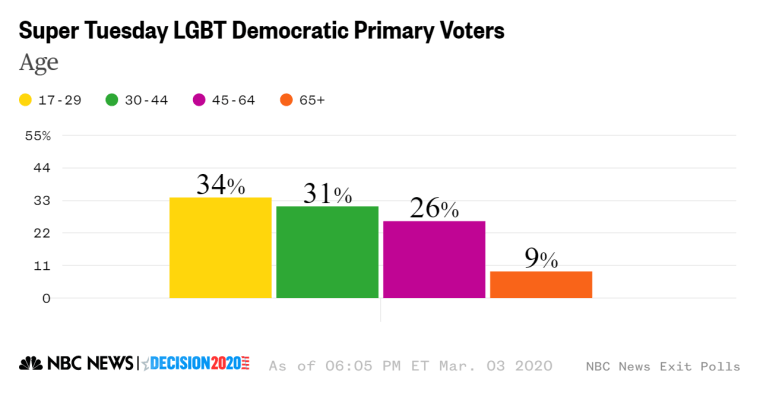
LGBT Super Tuesday voters are a strikingly liberal group: Exactly half of LGBT voters today call themselves "very liberal" and another 30 percent say they are “somewhat liberal.” Just 4 percent of LGBT Democratic voters say they are conservative.
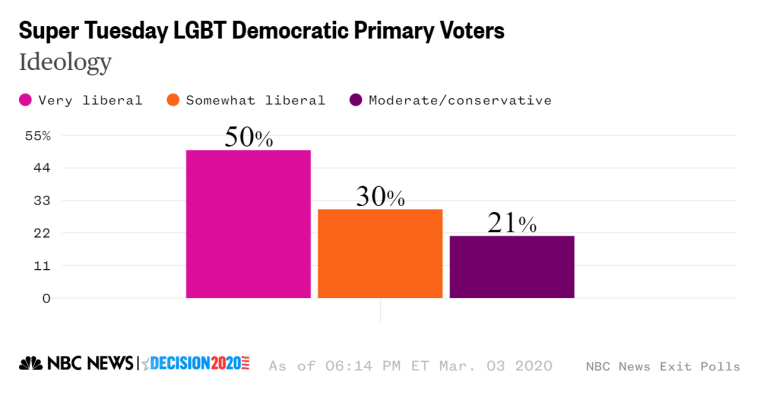
NBC News Exit Poll: Liberals account for more than 6 in 10 Super Tuesday voters
Liberal voters are dominating the electorate in Tuesday’s Democratic presidential primaries across the country, according to the NBC News Exit Poll conducted in 12 of the 14 Super Tuesday states.
Sixty-two percent of voters in Tuesday's primaries consider themselves liberal. This includes a quarter of voters who describe themselves as “very liberal.”

That puts the Super Tuesday electorate ideologically on par with voters in three of the four Democratic presidential contests held thus far: Liberals accounted for more than 60 percent of voters in Iowa, New Hampshire and Nevada. Last Saturday’s primary in South Carolina featured a more moderate electorate: Liberals accounted for just half of those voters.
Some Los Angeles voters cast begrudging ballots for Biden
Joe Gallagher voted on Super Tuesday for former Vice President Joe Biden in the Democratic presidential primary contest, but he's not thrilled about it.
"It's too bad because Bernie is the best candidate probably in 30 years," Gallagher, 65, told NBC News after he left a polling center in West Hollywood. "I really am embarrassed not to vote for him, but I felt like I had no choice."
Gallagher said he did a lot of research into polling and decided about two months ago that Biden was the most electable Democrat running.
His sentiment was shared by other voters around Los Angeles.
"My objective and goal is to get Trump out of office," said Tara, 26, who strongly supports Elizabeth Warren. But on Tuesday morning, she too decided to vote for Biden.
Tara concluded after talking to friends that the race was quickly becoming one between Biden and Bernie Sanders, and she didn't want to get behind Sanders.
"It took much deliberation, and I'm not so happy," Tara said, "but I think, unfortunately, voting for Warren may be a wasted vote that I don't want to do, even though I love Warren."
Still, voters like Naz, 41, are sticking with Sanders, a candidate he sees as an antidote to President Donald Trump's policies.
"It's nice to see someone try to take this country to the very far left, since Trump has taken it to the far right, because I think America is too far in the middle," Naz explained. "I think Bernie will take it far left, which will balance out this country a bit."
NBC News Exit Poll: In three states, half of Democratic voters say self-funded campaigns are unfair
Large shares of Democratic primary voters generally take a negative view of self-funded campaigns by billionaires like Mike Bloomberg and Tom Steyer, according to early results from the NBC News Exit Poll.
In the three states where Super Tuesday voters were asked about the issue, about half said it is unfair that candidates can spend unlimited amounts of their own money on their campaigns. This sentiment ranged from 49 percent of Democratic primary voters in Texas and Tennessee to 53 percent in North Carolina.
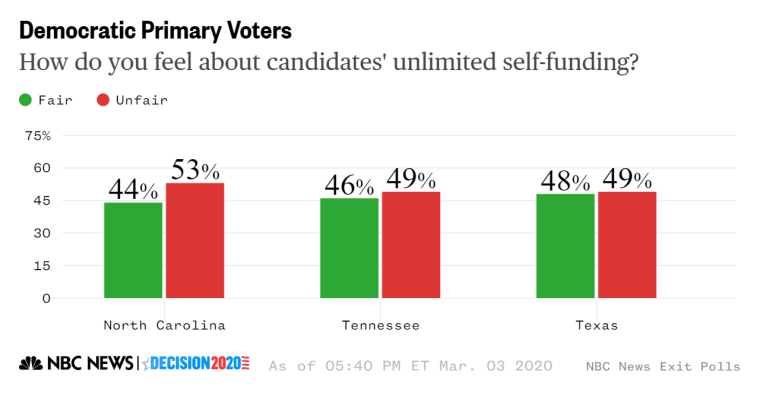
Among the remaining candidates, this issue is front and center for Bloomberg, who has invested $500 million of his own money into his campaign. About three in 10 voters who supported Bloomberg in these states said that candidates spending unlimited amounts of their own money on their campaigns is unfair.
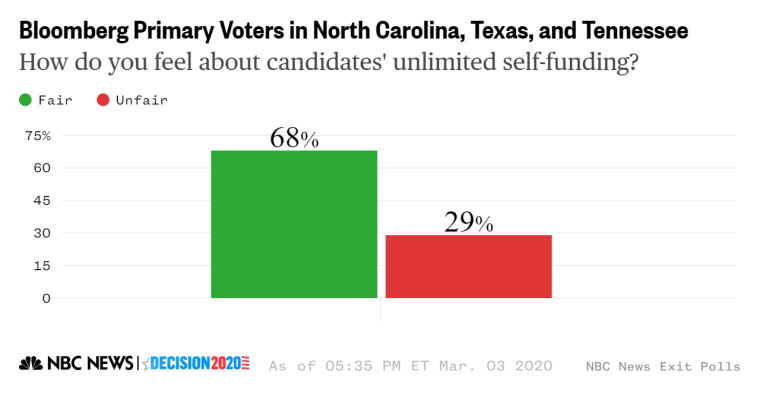
Los Angeles voters see long lines at some polling centers
LOS ANGELES — Voters lined up around the block at several locations around the Beverly Grove and West Hollywood neighborhoods in Los Angeles.
The city has nearly 1,000 voting centers open around the county, and around a quarter of them were open for early voting in the days leading up to Super Tuesday. But for voters who showed up on primary day, many found lines longer than usual.
At one polling center on West Knoll Drive, where about 100 people waited in a line stretching down the block, voters told NBC News that they had waited for nearly 75 minutes to vote. Those casting ballots nearby at Rosewood Avenue Elementary School and Laurel Span School said they had waited 25 to 30 minutes, but several said there usually isn't any wait.
Polling workers walked around outside of one location at a recreation center on North Vista Avenue in West Hollywood instructing people waiting in line that they could start filling out their election choices on LAvote.net, then use a QR code once they're inside to print a ballot with their picks already selected. That process is part of a new voting machine setup in Los Angeles County.
Bloomberg goes to Oz for voter outreach
NBC News Exit Poll: 1 in 7 Super Tuesday voters won’t pledge to support the Democratic nominee
Fourteen percent of those voting in Democratic primaries across the country Tuesday aren’t committing to voting for the party’s nominee in November, according to the NBC News Exit Poll conducted in 12 of the 14 Super Tuesday states. That’s about 1 in 7 voters.
As they left the polls, voters were asked if they planned to vote for the Democratic nominee this fall “regardless of who it is.” Supporters of Mike Bloomberg were least likely to pledge to vote Democratic in November: 18 percent of his voters wouldn't commit to the party’s ticket.
The most loyal Democratic voters? Supporters of Elizabeth Warren. Ninety-one percent of her voters said they’d support the party’s nominee regardless of who it is.
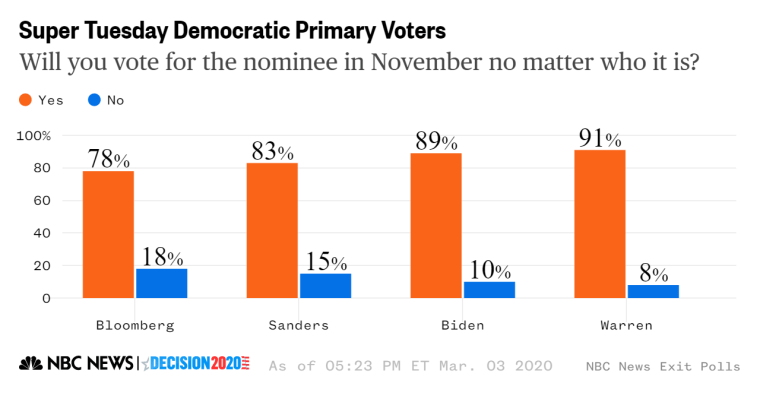
Power outage hits LAX airport, nearby polling places
Several terminals at Los Angeles International Airport and nearby polling stations lost electrical power on Tuesday afternoon, officials said.
Power started being restored about 20 minutes later.
Click here for the full story.
Gabbard lashes out after Fox contributor Rove calls Warren 'the only woman left'
These LA residents were into voting before it was cool
NBC News Exit Poll: Four in 10 Super Tuesday Democrats are voters of color
Roughly 4 in 10 voters in today’s Democratic presidential primaries are people of color, according to the NBC News Exit Poll conducted in 12 of the 14 Super Tuesday states. Latinos make up nearly 1 in 5 Democrats (18 percent) voting today; African Americans account for another 14 percent of voters. Asian voters and those identifying as “other” each make up 3 percent.
These numbers mean that the Super Tuesday primary electorate is much more diverse than the two earliest Democratic contests held last month in Iowa and New Hampshire.
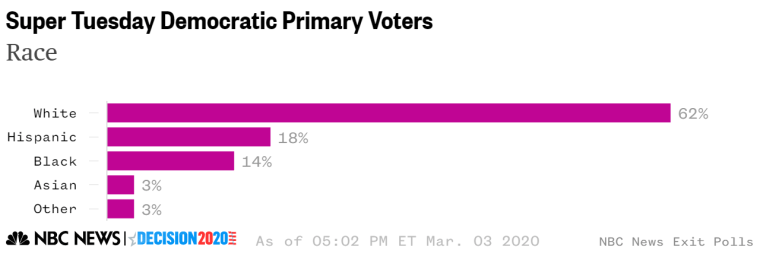
But as in each of the four previous Democratic caucuses and primaries, today’s voters are on the older side. More than half — 64 percent — of today’s Democratic voters are 45 or over, including the 29 percent of voters who are age 65 or over. Just 13 percent of those voting this Super Tuesday are younger than 30.


Results reported here reflect data combined from NBC News Exit Poll surveys conducted in 12 of the 14 states holding Democratic presidential primaries on Super Tuesday (Alabama, California, Colorado, Maine, Massachusetts, Minnesota, North Carolina, Oklahoma, Tennessee, Texas, Vermont and Virginia). Results are weighted to reflect differences in the sizes of state electorates.
Super Tuesday voting machine risks
While all fingers are crossed for a smooth electoral process, some Super Tuesday states are using machines with a higher likelihood of issues.
These can include new machines getting the kinks worked out for the first time in a primary, old machines known for glitches, and machines with no paper trail if something goes wrong. Without a paper trail, the only way to check is by running a test on the messed-up machine.
Thirty-nine counties in Arkansas, Tennessee, and Texas will use the ES&S iVotronic, a “first-generation” touchscreen device prone to having an issue where the voter touches one candidate but the screen registers a different candidate. In the past confused voters have uploaded videos of it happening, leading to viral claims of “vote flipping.”
Nearly half the counties In Tennessee will use the MicroVote Infinity, an ancient push-button machine with security issues and no paper trail.
Six counties across the country in California, Tennessee, Texas, Utah will use the Dominion AccuVote TSX, which has been thoroughly hacked by researchers and its source code posted online. Hackers have made it run video games like Pacman and DOOM. Some counties using it have a paper trail, some don’t. Counties that have it tend to use it as an accessibility device, not as the primary means of voting.
Other places and issues:
CALIFORNIA
Los Angeles County is rolling out its Voting Solutions for All People VSAP which has already had a handful of issues in early voting. There were reports of centers closed for ballots getting jammed, workers not knowing security codes, and an insufficient number of poll workers. Two counties are using the AccuVote TSX, with a paper trail.
NORTH CAROLINA
More than half of North Carolinians are voting on new equipment. A few months ago a local Pennsylvania race was thrown into disarray when new equipment improperly configured by maker ES&S showed a judge as getting zero votes. They fixed the issue in the audit but it was a mess.
TEXAS
Nearly 40 percent of Texans are voting on touchscreens with no paper trail.
TENNESSE
Seventy percent of voters are using electronic voting machines with no paper trail.
UTAH
One county is using the AccvuoteTSX. They will have a paper trail.
Frustration for early voters whose candidates have dropped out of the race
The abrupt departures of Pete Buttigieg and Amy Klobuchar from the Democratic presidential race on the eve of Super Tuesday primaries could be frustrating for the millions of people who have already voted in those 14 states and might have cast ballots for them.
Early voting began in January in many of the Super Tuesday states, and in large part, once a vote is cast, it is final, according to state election officials.
In California, with more than 400 delegates are at stake, nearly 1.6 million Democrats had returned mail-in ballots as of Monday afternoon, according to a ballot tracker maintained by Political Data Inc. If an early ballot there was marked for a candidate no longer in the race, a voter can take in their ballot for a new one, and make a second choice. But once the ballot is submitted, that’s it.
In Colorado, Secretary of State Jena Griswold tweeted on Sunday that only those who had marked a ballot but not yet returned it could make a second selection, or get a new ballot.
At a Colorado event for Klobuchar on Monday, Amy Valore-Caplan, a 46-year-old writer in Denver, showed up to find out that the Minnesota senator, for whom she had waited until the last minute to cast her mail-in ballot, had dropped out.
Valore-Caplan said she knew Klobuchar’s candidacy was on the bubble, and actually hesitated Sunday, when she saw Buttigieg end his campaign. “I thought it was safe,” she said, of her decision to wait another day. “I was waiting to make sure she didn’t drop out.”
Bernie Sanders votes in Vermont
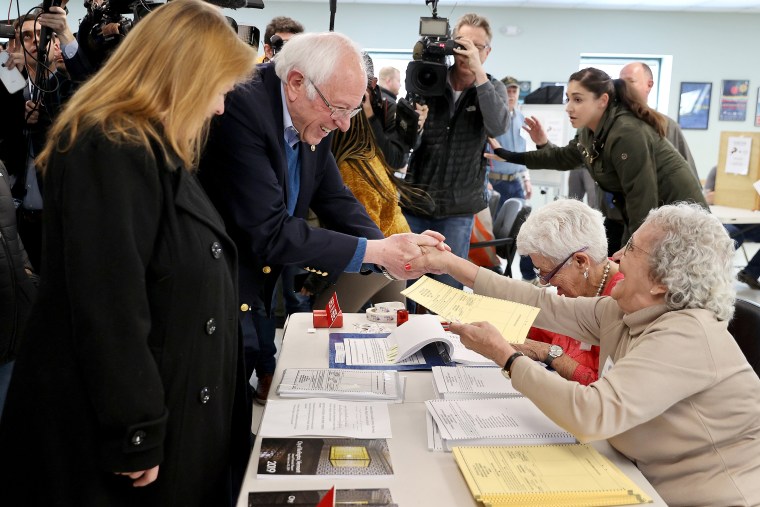
NBC News Exit Poll: Voters split on if they prefer return to Obama era versus more liberal policies
Former President Barack Obama may be deeply popular with rank and file Democrats, but Super Tuesday voters today are divided over whether they’d like to see a return to the former president’s policies — or if they instead prefer policies that are even more liberal.
According to the NBC News Exit Poll conducted in 12 of the 14 Super Tuesday states, 44 percent of Democratic voters across the country would like the next president to return to Obama’s policies. That’s just slightly ahead of the 38 percent of voters who prefer more liberal policies. Reflecting the liberal tilt of the Democratic primary electorate, just 11 percent want to change to more conservative policies.

Results reported here reflect data combined from NBC News Exit Poll surveys conducted in 12 of the 14 states holding Democratic presidential primaries on Super Tuesday (Alabama, California, Colorado, Maine, Massachusetts, Minnesota, North Carolina, Oklahoma, Tennessee, Texas, Vermont and Virginia). Results are weighted to reflect differences in the sizes of state electorates.
NBC News Exit Poll: 3 in 10 Super Tuesday voters say they picked a candidate in just the last few days
Many voters in Tuesday’s Democratic presidential primaries across the country waited until just recently to choose a candidate, according to early results from the NBC News Exit Poll conducted in 12 of the 14 Super Tuesday states.
About 1 in 10 voters said they waited until Tuesday to decide on their choice, and another 19 percent of voters decided in just “the last few days.”
The share of voters making late decisions is of particular interest this year, as two candidates — Pete Buttigieg and Amy Klobuchar — dropped out of the race and endorsed Joe Biden in the 48 hours before polls opened across the country.
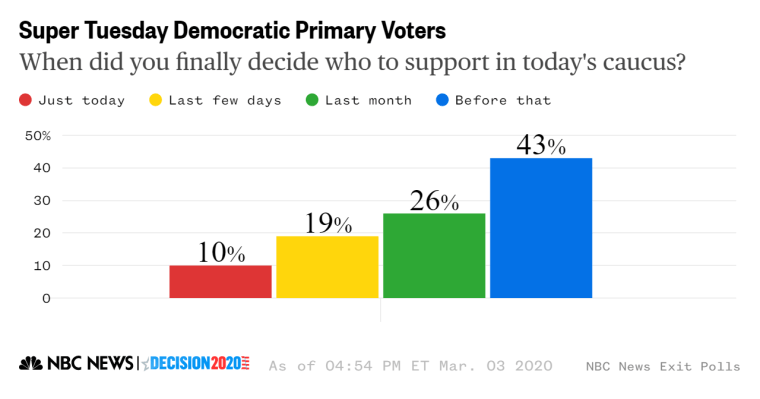
Results reflect data combined from NBC News Exit Poll surveys conducted in 12 of the 14 states holding Democratic presidential primaries or caucuses on Super Tuesday (Alabama, California, Colorado, Maine, Massachusetts, Minnesota, North Carolina, Oklahoma, Tennessee, Texas, Vermont and Virginia). Results are weighted to reflect differences in the sizes of state electorates.
